.jpg)
Understanding Scholarships
Scholarships are financial aids that can alleviate the burden of tuition costs for many students. They come in various forms and cater to different needs and talents.
- Scholarships do not require repayment, making them an ideal choice for funding education.
- Eligibility often depends on academic performance, financial needs, or extracurricular achievements.
For example, a student who excels in science might seek out STEM scholarships, while another passionate about social issues may apply for community service scholarships. Overall, understanding scholarships can open doors to educational opportunities and lessen financial strain.

Types of Scholarships
Understanding the various types of scholarships available is crucial for students seeking financial assistance. Different scholarships cater to a range of interests, backgrounds, and academic achievements, making it essential to explore all options. Here are some key categories:
- Merit-Based Scholarships: Awarded for academic achievements or talents.
- Need-Based Scholarships: Designed for students with financial constraints.
- Athletic Scholarships: For talented athletes who excel in sports.
- Minority Scholarships: Aimed at supporting underrepresented groups.
By identifying the type of scholarship that resonates with their strengths or circumstances, students can significantly enhance their chances of securing funding for their education.

Merit-Based Scholarships
Among the various types of scholarships, merit-based scholarships stand out for recognizing academic excellence and exceptional talents. These scholarships reward students who excel in specific areas, providing a significant boost to their pursuit of higher education.
- Eligibility Criteria: Typically based on GPA, standardized test scores, or outstanding achievements in areas such as the arts, athletics, or leadership.
For instance, a student who has consistently achieved high marks in mathematics may qualify for a merit-based scholarship in STEM fields.
- Benefits of Merit-Based Scholarships:
- Help reduce tuition costs.
- Enhance a student's resume or application profile.
- Encourage continued academic diligence.
In a world where competition is fierce, securing a merit-based scholarship can open numerous opportunities for deserving students.
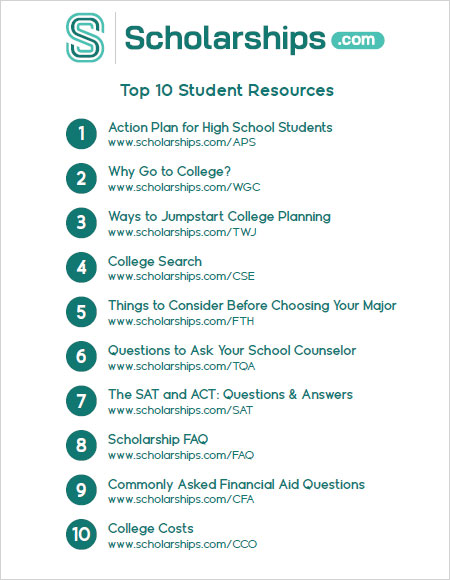
Need-Based Scholarships
Moving on from merit-based scholarships, need-based scholarships offer a lifeline to students who face financial hardships. These scholarships are designed to help those who might otherwise struggle to afford college tuition and related expenses.
- Eligibility Criteria: Typically determined by the student’s or family’s financial situation, often requiring documentation like income statements or tax returns.
For example, a student from a low-income household might qualify for a need-based scholarship, enabling them to pursue their dream degree without the weight of financial stress.
- Advantages of Need-Based Scholarships:
- Provide significant financial assistance, covering tuition and sometimes living expenses.
- Expand access to education for students from diverse backgrounds.
- Often renew based on continued financial need, fostering long-term support.
Need-based scholarships are pivotal in leveling the educational playing field, allowing deserving students to thrive academically without financial burdens.

Athletic Scholarships
Shifting our focus to athletic scholarships, these awards recognize talented athletes who demonstrate exceptional skill in sports while also maintaining academic standards. This type of scholarship can significantly ease the financial burden on student-athletes.
- Eligibility Criteria: Generally based on athletic performance, recruitment potential, and sometimes academic achievement.
For instance, a high school soccer star may garner attention from NCAA colleges seeking to bolster their team, leading to potential scholarship offers.
- Benefits of Athletic Scholarships:
- Cover tuition and other educational expenses, allowing athletes to focus on training and academics.
- Enhance college applications by showcasing a commitment to sports and teamwork.
- Create networking opportunities and connections within the athletic community.
By merging athletic aptitude with academic aspirations, athletic scholarships allow dedicated students to pursue their passions both on and off the field.

Academic Scholarships
Continuing from athletic scholarships, academic scholarships are specifically awarded to students demonstrating outstanding academic prowess. These scholarships not only reward excellence but also encourage students to maintain high academic standards throughout their educational journey.
- Eligibility Criteria: Based on GPA, SAT or ACT scores, and sometimes involvement in academic competitions.
For example, a student who consistently earns top grades and excels in advanced placement courses might qualify for an academic scholarship from their chosen college or university.
- Benefits of Academic Scholarships:
- Directly offset tuition costs, making higher education more accessible.
- Validate a student's hard work and dedication to their studies.
- Open doors to prestigious institutions eager to attract top academic talent.
In a competitive academic landscape, securing an academic scholarship can provide significant advantages that pave the way for future success.

Minority Scholarships
As we delve into minority scholarships, these financial aids are specifically crafted to support students from underrepresented backgrounds. Aimed at promoting diversity and inclusion in higher education, they play a crucial role in leveling the educational playing field.
- Eligibility Criteria: Generally available to students who identify as part of a minority group, such as racial or ethnic minorities, LGBTQ+ individuals, or those with disabilities.
For instance, a Latina student pursuing a degree in engineering may apply for a scholarship specifically designed for women and minorities in STEM fields.
- Benefits of Minority Scholarships:
- Help address financial disparities in education.
- Promote diverse perspectives within academic environments.
- Foster leadership and academic success among underrepresented groups.
By pursuing minority scholarships, students not only ease their financial burdens but also contribute to a richer, more inclusive educational landscape.

Women-Specific Scholarships
Building on the importance of minority scholarships, women-specific scholarships are designed to empower female students pursuing higher education. These scholarships aim to bridge the gender gap in various fields, particularly in historically male-dominated areas.
- Eligibility Criteria: Typically awarded to women enrolled in specific programs, or those who demonstrate leadership, community service, or academic excellence.
For example, a woman aspiring to be a computer scientist may seek out scholarships targeted at females in technology, providing her with financial support and networking opportunities.
- Benefits of Women-Specific Scholarships:
- Encourage participation of women in diverse fields.
- Enhance career prospects and professional networks.
- Provide financial relief and reduce barriers to education.
By applying for women-specific scholarships, female students can confidently pursue their academic and career goals, contributing to greater gender parity in all sectors.
.jpg)
International Student Scholarships
Transitioning from women-specific scholarships, international student scholarships offer invaluable financial aid to students from abroad seeking to study in a different country. These scholarships help ease the transition and address the unique challenges faced by international students.
- Eligibility Criteria: Usually based on academic merit, country of origin, or specific talents and interests.
For example, a student from India pursuing a postgraduate degree in environmental science in the United States might apply for scholarships specifically reserved for international applicants.
- Benefits of International Student Scholarships:
- Help cover tuition and living expenses, making education abroad more accessible.
- Foster cultural exchange and diversity on campuses.
- Enhance global networking opportunities for future careers.
International student scholarships not only provide crucial financial support but also enrich the academic community by promoting a diverse and interconnected global environment.

Graduate Scholarships
Continuing from the topic of international student scholarships, graduate scholarships are specifically tailored for students pursuing advanced degrees such as master's or doctoral programs. These scholarships are vital for easing the financial challenges that often accompany higher education.
- Eligibility Criteria: Often based on academic excellence, research potential, or specified fields of study.
For instance, a student aspiring for a master’s in psychology may apply for scholarships aimed at those entering mental health or counseling services.
- Benefits of Graduate Scholarships:
- Reduce financial burden, allowing students to focus on research and study.
- Enhance opportunities for networking with professionals in their field.
- Often linked to teaching or research assistantships, providing hands-on experience.
By securing graduate scholarships, students can take significant strides toward their academic and career aspirations, while also contributing to their respective fields in meaningful ways.

Undergraduate Scholarships
Transitioning from graduate scholarships, undergraduate scholarships are crucial for students entering or currently enrolled in their bachelor’s degree programs. These awards help alleviate the financial strain associated with tuition and living expenses during the formative years of higher education.
- Eligibility Criteria: Generally based on academic performance, extracurricular activities, or financial need.
For example, a high school senior committed to community service might apply for a scholarship that recognizes civic engagement while planning to pursue a degree in social work.
- Benefits of Undergraduate Scholarships:
- Provide essential financial support, allowing students to focus on their studies and experiences.
- Foster academic excellence and encourage involvement in campus life.
- Can often lead to additional opportunities, including internships and mentorships.
By pursuing and obtaining undergraduate scholarships, students can embark on their college journeys with greater confidence and fewer financial worries, paving the way for a successful educational experience.

Community Service Scholarships
Building on the discussion of undergraduate scholarships, community service scholarships reward students dedicated to making a positive impact in their communities. These scholarships not only recognize altruism but also encourage further engagement in civic activities.
- Eligibility Criteria: Often based on volunteer experience, community involvement, and leadership qualities.
For example, a student who volunteers at a local homeless shelter and organizes food drives may qualify for a community service scholarship aimed at promoting social responsibility and outreach.
- Benefits of Community Service Scholarships:
- Provide financial assistance that often aligns with the student’s values and passions.
- Enhance college applications by highlighting a commitment to service and leadership.
- Foster a sense of community and responsibility among recipients.
By applying for community service scholarships, students can gain financial support while continuing to contribute positively to society, making education more meaningful and enriching.

Military Scholarships
Transitioning from community service scholarships, military scholarships provide vital financial support to current and former service members and their families as they pursue higher education. These scholarships honor their sacrifices and encourage educational advancement.
- Eligibility Criteria: Typically available to active-duty personnel, veterans, and their dependents, often requiring proof of military service.
For instance, a veteran returning to civilian life may apply for a military scholarship specifically tailored for those entering nursing programs, helping to bridge the gap between military and civilian careers.
- Benefits of Military Scholarships:
- Alleviate the financial burden of tuition and related expenses for service members and their families.
- Foster a sense of camaraderie and support within the military community.
- Often come with additional resources, such as mentorship and career services.
By taking advantage of military scholarships, recipients can access quality education and transition successfully into civilian roles, all while receiving recognition for their dedication to service.

Employer-Sponsored Scholarships
Moving on from military scholarships, employer-sponsored scholarships are initiatives provided by companies to support their employees or their dependents in pursuing higher education. These scholarships foster a culture of learning and professional development within the workplace.
- Eligibility Criteria: Typically available to employees, their spouses, or children, often requiring a commitment to work for the company for a specified period after graduation.
For instance, a large tech company may offer scholarships for employees pursuing degrees in computer science, encouraging skill development that directly benefits the organization.
- Benefits of Employer-Sponsored Scholarships:
- Provide substantial financial assistance covering tuition and fees.
- Enhance employee retention by investing in their professional growth.
- Create a stronger workforce with employees who are more educated and skilled.
By taking advantage of employer-sponsored scholarships, individuals can not only lessen their financial burden but also align their educational pursuits with their career goals, creating a win-win situation for both the employee and the employer.

Creative and Performing Arts Scholarships
Continuing from employer-sponsored scholarships, creative and performing arts scholarships celebrate students who exhibit exceptional talent in areas such as music, drama, dance, visual arts, and more. These scholarships not only provide financial support but also encourage artistic expression.
- Eligibility Criteria: Often based on auditions, portfolios, or previous achievements in the arts, as well as academic performance.
For example, a budding musician may seek a scholarship that requires submitting a performance video or auditioning live, showcasing their skills and passion for music.
- Benefits of Creative and Performing Arts Scholarships:
- Aid in covering tuition and costs associated with art supplies or lessons.
- Provide opportunities for networking within the arts community.
- Encourage artistic pursuits that enrich campus culture and diversity.
By pursuing creative and performing arts scholarships, students can gain recognition for their talent while receiving the financial assistance necessary to develop their skills and pursue their passions in education.
.jpg)
STEM Scholarships
Transitioning from creative and performing arts scholarships, STEM scholarships are specifically aimed at students pursuing degrees in science, technology, engineering, and mathematics. These scholarships address the critical demand for skilled professionals in these fast-growing fields.
- Eligibility Criteria: Usually based on academic performance in relevant subjects, involvement in STEM-related extracurricular activities, and sometimes financial need.
For instance, a high school student who participates in robotics competitions might apply for a STEM scholarship that supports future engineers and scientists.
- Benefits of STEM Scholarships:
- Help cover tuition costs and educational resources, such as lab equipment and materials.
- Often connect students with internships or mentorships in the industry.
- Encourage more individuals, particularly women and minorities, to enter these fields.
By pursuing STEM scholarships, students can secure the financial support they need while contributing to the future of innovation and technology through their educational endeavors.

Medical and Healthcare Scholarships
Following the exploration of STEM scholarships, medical and healthcare scholarships focus on students aiming to pursue careers in medicine, nursing, public health, and related fields. These scholarships play a crucial role in preparing the next generation of healthcare professionals.
- Eligibility Criteria: Often based on academic achievements, volunteer experience in healthcare settings, and a dedication to serving under-resourced communities.
For example, a nursing student passionate about community health might apply for a scholarship that supports those committed to reducing healthcare disparities.
- Benefits of Medical and Healthcare Scholarships:
- Alleviate the financial burden of expensive tuition and training costs.
- Encourage students to explore specialized fields, such as geriatrics or pediatrics.
- Frequently include networking opportunities and clinical placement assistance.
By securing medical and healthcare scholarships, students can not only pursue their educational goals but also contribute meaningfully to improving health outcomes in their communities.

Business and Finance Scholarships
Transitioning from medical and healthcare scholarships, business and finance scholarships cater to students aspiring to excel in the competitive world of commerce, finance, and entrepreneurship. These scholarships are vital for shaping future leaders in various business sectors.
- Eligibility Criteria: Typically based on academic performance, extracurricular involvement, and sometimes specific career aspirations within business fields.
For example, a student who leads a finance club at their school may apply for a scholarship aimed at encouraging young leaders in economics and business.
- Benefits of Business and Finance Scholarships:
- Help reduce the overall cost of a business education, often associated with high tuition fees.
- Provide networking opportunities with industry professionals and alumni.
- Frequently linked to internships, offering invaluable real-world experience.
By pursuing business and finance scholarships, students can not only ease their financial burdens but also gain essential skills and connections that significantly impact their future careers in the business world.
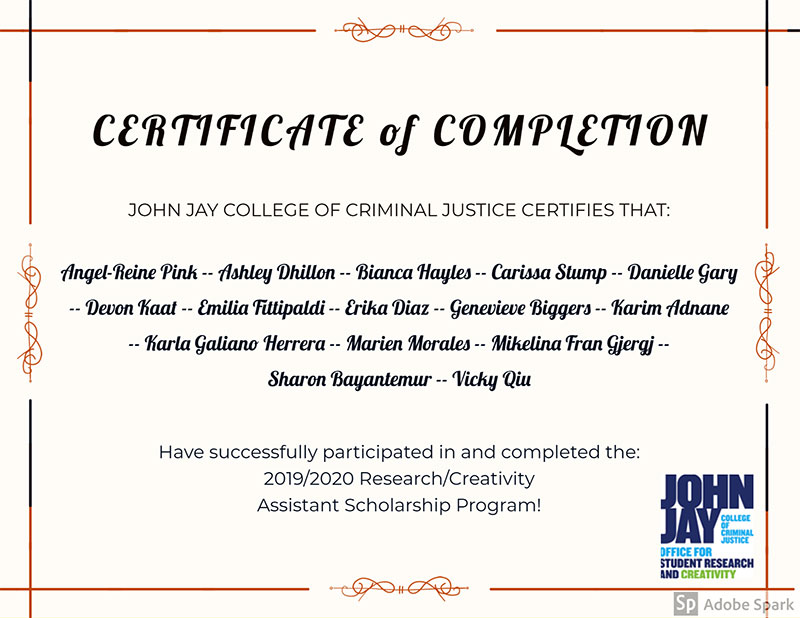
Law and Criminal Justice Scholarships
Continuing from business and finance scholarships, law and criminal justice scholarships support students pursuing careers in the legal field, criminal justice, or law enforcement. These scholarships empower future advocates, officers, and policy-makers to make a positive impact on society.
- Eligibility Criteria: Generally based on academic performance, commitment to social justice, and involvement in community service or related activities.
For example, a student interested in criminal defense might apply for a scholarship that recognizes dedication to advocating for equitable justice.
- Benefits of Law and Criminal Justice Scholarships:
- Offset the high costs of law school or criminal justice programs.
- Connect students with mentors in the legal field for guidance and networking.
- Encourage involvement in internships and practical experience opportunities within the system.
By applying for law and criminal justice scholarships, students can gain both critical financial assistance and a platform to pursue their passion for justice and advocacy.

Education and Teaching Scholarships
Following our discussion on law and criminal justice scholarships, education and teaching scholarships focus on supporting individuals dedicated to shaping future generations. These scholarships are essential for students pursuing degrees in education, fostering the next wave of teachers.
- Eligibility Criteria: Often awarded based on academic performance, commitment to teaching in underserved areas, or previous teaching experience.
For instance, a student majoring in elementary education could apply for a scholarship encouraging future teachers to serve in low-income schools, promoting educational equity.
- Benefits of Education and Teaching Scholarships:
- Help cover tuition costs for education programs, which can be increasingly expensive.
- Provide opportunities for networking with educators and institutions.
- Often include resources for classroom materials or teaching internships.
By securing education and teaching scholarships, aspiring educators can achieve their goals while contributing positively to their communities and enhancing the quality of education for all students.

Engineering and Technology Scholarships
Continuing from education and teaching scholarships, engineering and technology scholarships are tailored for students eager to innovate and excel in fields such as engineering, computer science, and information technology. These scholarships are vital for developing the next generation of creators and problem-solvers.
- Eligibility Criteria: Typically awarded based on academic achievements in math and science, as well as involvement in relevant extracurricular activities or projects.
For instance, a high school senior who participates in robotics competitions might apply for a scholarship designed to support future engineers and technologists.
- Benefits of Engineering and Technology Scholarships:
- Help offset tuition costs in demanding and often costly programs.
- Provide access to internships and mentorship opportunities within the tech industry.
- Encourage diversity by supporting underrepresented groups in engineering and technology fields.
By seeking engineering and technology scholarships, students can access the financial support they need while forging impactful careers that shape the future of innovation and technology.

Environmental Science Scholarships
Transitioning from engineering and technology scholarships, environmental science scholarships aim to support students dedicated to addressing pressing ecological issues. These scholarships foster the development of future environmental leaders and advocates who can contribute to sustainability and conservation efforts.
- Eligibility Criteria: Typically based on academic performance in environmental studies and related fields, or demonstrated commitment to sustainability initiatives.
For example, a student actively engaged in local clean-up projects or conservation competitions might apply for a scholarship focused on promoting environmental awareness.
- Benefits of Environmental Science Scholarships:
- Help alleviate tuition costs for programs in environmental science, ecology, or environmental policy.
- Offer opportunities for internships with organizations committed to sustainability efforts.
- Connect students with a network of passionate professionals in the field.
By pursuing environmental science scholarships, students can gain the financial backing necessary to make a meaningful impact on the planet's future while pursuing their passion for environmental stewardship.

Social Sciences and Humanities Scholarships
Continuing from environmental science scholarships, social sciences and humanities scholarships are designed to support students pursuing degrees in disciplines such as psychology, sociology, history, and literature. These scholarships play a crucial role in fostering critical thinking and cultural understanding.
- Eligibility Criteria: Often based on academic excellence, research interests, or community involvement in social justice initiatives.
For instance, a student committed to exploring historical injustices might apply for a scholarship aimed at promoting the study of history and its relevance in today's society.
- Benefits of Social Sciences and Humanities Scholarships:
- Help reduce the financial burden of liberal arts education.
- Encourage students to engage in impactful research and internships related to social issues.
- Provide valuable networking opportunities with professionals in teaching, counseling, and social services.
By securing social sciences and humanities scholarships, students can deepen their understanding of societal complexities while paving the way for meaningful careers dedicated to improving communities and global awareness.

Vocational and Trade School Scholarships
Transitioning from social sciences and humanities scholarships, vocational and trade school scholarships are tailored for students pursuing practical skills and certifications in fields such as plumbing, electrical work, culinary arts, and automotive technology. These scholarships are essential for preparing skilled professionals.
- Eligibility Criteria: Generally based on financial need, prior achievements in relevant coursework, or a demonstrated commitment to a specific trade.
For example, a student who has excelled in a welding course may apply for a scholarship that supports aspiring tradespeople entering the skilled labor market.
- Benefits of Vocational and Trade School Scholarships:
- Help cover tuition and equipment costs associated with technical training.
- Open doors to apprenticeships and job placements in high-demand fields.
- Encourage students to pursue rewarding careers that contribute to local economies.
By pursuing vocational and trade school scholarships, students can gain the financial support needed to embark on fulfilling careers, bridging the gap between education and hands-on skill development in essential industries.
.jpg)
Online Program Scholarships
Transitioning from vocational and trade school scholarships, online program scholarships cater to students pursuing degree programs through online platforms. As online education continues to grow, these scholarships provide essential financial support for those seeking flexibility in their academic pursuits.
- Eligibility Criteria: Typically based on academic performance, commitment to online learning, or specific fields of study.
For instance, a busy working professional might apply for a scholarship specifically supporting online students in business administration or information technology.
- Benefits of Online Program Scholarships:
- Help cover tuition costs for online courses, which can vary significantly in price.
- Encourage access to a wider range of programs that may not be available locally.
- Often provide networking opportunities with peers and faculty from diverse backgrounds.
By applying for online program scholarships, students can take advantage of the flexibility that online education offers while receiving the financial assistance necessary to achieve their educational goals.

Full-Ride Scholarships
Continuing from online program scholarships, full-ride scholarships are among the most coveted types of financial aid, covering all tuition and associated costs for a student’s entire college education. These scholarships can significantly alleviate financial stress for high-achieving students.
- Eligibility Criteria: Generally based on outstanding academic performance, leadership skills, and other talents such as athletics or performing arts.
For example, a valedictorian might apply for a full-ride scholarship offered by a prestigious university, which recognizes both academic excellence and community involvement.
- Benefits of Full-Ride Scholarships:
- Completely cover tuition, fees, and often room and board, enabling students to focus solely on their studies.
- Provide peace of mind regarding financial planning for college expenses.
- Open doors to prestigious institutions that enhance future career opportunities.
By securing a full-ride scholarship, students can embark on their academic journeys with confidence, knowing that financial barriers have been removed, allowing them to fully engage in their educational experiences.

Partial Scholarships
Transitioning from full-ride scholarships, partial scholarships offer significant financial support but do not cover the entire cost of tuition and fees. These scholarships can still make higher education more manageable and accessible for many students.
- Eligibility Criteria: Often awarded based on academic performance, financial need, or specific talents relevant to the scholarship focus.
For instance, a student who excels in science might receive a partial scholarship from a university to help cover tuition costs, motivating them to pursue their desired degree.
- Benefits of Partial Scholarships:
- Reduce the overall financial burden of college expenses, making it easier to budget.
- Can often be combined with other forms of financial aid, such as grants or work-study programs.
- Provide opportunities to network with scholarship providers or affiliated organizations.
By applying for partial scholarships, students can alleviate some financial stress, allowing them to focus on their studies and embrace their college experience more fully.

Local vs. National Scholarships
Continuing from the topic of partial scholarships, understanding the differences between local and national scholarships can help students make informed decisions in their search for financial aid. Both types offer unique advantages suited to different needs.
- Local Scholarships: Typically awarded by community organizations, schools, or businesses, these scholarships often focus on students within a specific geographic region.
- Focus on local community involvement or achievements.
- May have less competition due to a smaller applicant pool.
- Often reflect the values of the local community.
For example, a student active in local volunteer work might apply for a scholarship sponsored by a nearby nonprofit organization.
- National Scholarships: Offered by larger organizations or corporations, these scholarships generally have a broader eligibility range.
- Tend to have a more competitive applicant pool.
- Can offer larger amounts of funding.
- Often aimed at specific fields of study or demographics.
By strategically applying for both local and national scholarships, students can maximize their chances of receiving financial support and navigating their educational journeys more effectively.
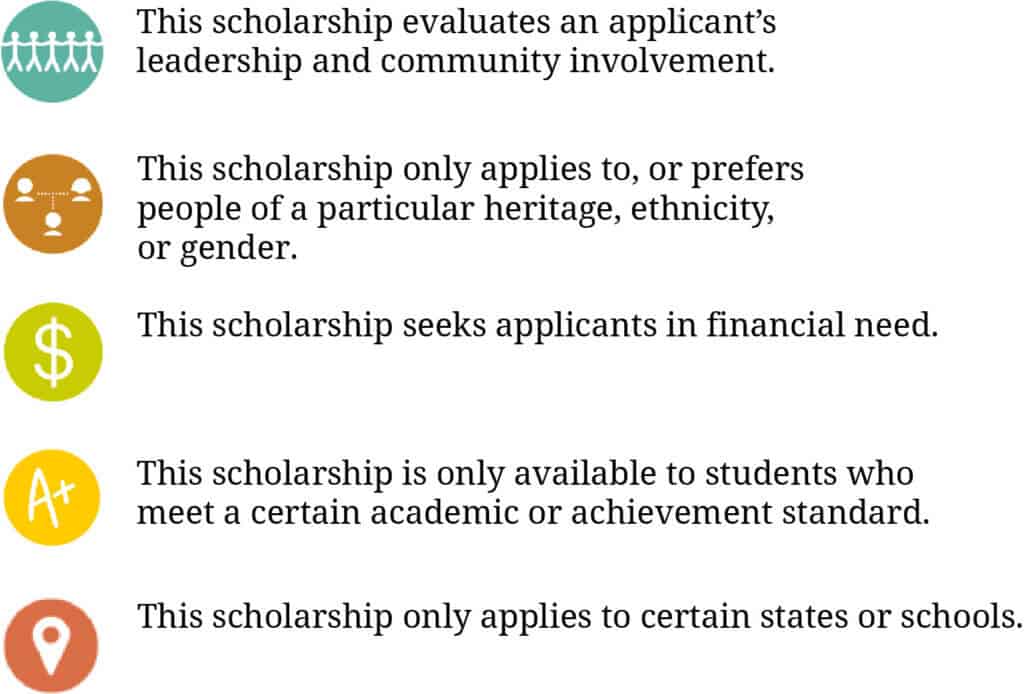
National Scholarships
Following our discussion on local vs. national scholarships, national scholarships are prestigious awards offered by organizations or institutions across the country. These scholarships are designed to attract a diverse pool of talented students and support their educational endeavors.
- Eligibility Criteria: Varies widely, often requiring strong academic performance, leadership roles, and involvement in extracurricular activities.
For instance, a high school senior with exceptional grades and a passion for community service may apply for a national scholarship dedicated to promoting social leadership.
- Benefits of National Scholarships:
- Can provide substantial financial support, often covering significant tuition costs.
- Offers recognition that enhances a student’s resume and college applications.
- Frequently provides networking opportunities with other scholars and professionals nationwide.
By applying for national scholarships, students can gain access to valuable resources and financial assistance that can greatly influence their academic and career trajectories.

College-Specific Scholarships
Transitioning from national scholarships, college-specific scholarships are financial aids provided by individual colleges or universities to attract students to their programs. These scholarships often reflect the institution's commitment to supporting their students' educational journey.
- Eligibility Criteria: Typically hinge on a combination of academic merit, financial need, and specific characteristics such as intended major or extracurricular involvement.
For instance, a student planning to major in environmental science might apply for a scholarship offered by a university with a strong sustainability program.
- Benefits of College-Specific Scholarships:
- Often provide larger amounts of funding, significantly reducing tuition costs.
- Can offer heightened recognition and prestige associated with the college.
- Allow for better access to resources, mentorship, and networking opportunities tailored to the chosen institution.
By exploring and applying for college-specific scholarships, students can enhance their educational experiences while alleviating some financial burdens associated with attending their desired colleges or universities.

Government-Funded Scholarships
Building on the topic of college-specific scholarships, government-funded scholarships are financial aids provided by federal or state governments to support students in their pursuit of higher education. These scholarships play a significant role in making education accessible to many.
- Eligibility Criteria: Often based on factors such as financial need, academic achievement, or specific demographic criteria, including awards for minority groups or underrepresented populations.
For example, a student from a low-income background may apply for a government-funded scholarship aimed at increasing access to higher education.
- Benefits of Government-Funded Scholarships:
- Can cover substantial costs like tuition, fees, and sometimes even living expenses.
- Encourage diversity and inclusion by targeting specific groups, fostering broader societal representation in academia.
- Often provided in conjunction with additional resources, like workshops and mentorship programs.
By applying for government-funded scholarships, students can gain essential financial support that enhances their ability to succeed while working towards their academic goals.

Private Organization Scholarships
Transitioning from government-funded scholarships, private organization scholarships are offered by various non-profit and for-profit entities, including foundations, corporations, and community organizations. These scholarships provide another valuable avenue for students seeking funding for their education.
- Eligibility Criteria: Generally depend on specific interests, demographics, or fields of study, with unique requirements set by the organization offering the scholarship.
For instance, a student majoring in nursing might apply for a scholarship from a healthcare foundation that supports future healthcare professionals.
- Benefits of Private Organization Scholarships:
- Often have targeted missions, addressing specific community needs or industry gaps, leading to more tailored support.
- Can provide access to exclusive opportunities, such as internships or networking events with industry leaders.
- Typically support both full-time and part-time students, expanding access to education for diverse learners.
By seeking private organization scholarships, students can uncover unique financial support and opportunities that align with their career goals and personal interests while minimizing the financial burden of college.
.jpg)
Non-Profit Organization Scholarships
Following the discussion on private organization scholarships, non-profit organization scholarships provide vital financial assistance to students through contributions from charitable foundations, community groups, and advocacy organizations. These scholarships often aim to empower individuals and make education accessible to all.
- Eligibility Criteria: Typically based on specific missions of the non-profit, these scholarships might focus on supporting underprivileged communities, addressing social justice issues, or promoting educational attainment in specialized fields.
For instance, a student involved in community activism may seek a scholarship from a non-profit dedicated to social change, which recognizes and rewards leadership in service projects.
- Benefits of Non-Profit Organization Scholarships:
- Often provide generous funding aimed at influencing positive change in communities.
- Encourage recipients to engage in volunteer work or community service, reinforcing the organization’s mission.
- Frequently include mentorship and professional development opportunities, aligning students with experienced professionals in their fields of interest.
By pursuing non-profit organization scholarships, students not only gain financial support but also contribute to meaningful causes that resonate with their values and aspirations, positively impacting their communities as they further their education.

Corporate Sponsorships for Education
Transitioning from non-profit organization scholarships, corporate sponsorships for education are initiatives where businesses provide financial support for students pursuing various degrees. These sponsorships aim to develop future talent while enhancing the company’s presence in the educational landscape.
- Eligibility Criteria: Often geared toward students studying fields relevant to the sponsoring company, such as technology, engineering, or business management. Some may focus on specific demographics, like underrepresented minorities or female students.
For instance, a technology company could sponsor a scholarship for students majoring in computer science, which helps to fuel the talent pipeline while supporting educational aspirations.
- Benefits of Corporate Sponsorships:
- Frequently provide substantial financial support, covering tuition, fees, or even internships.
- Help students gain valuable industry experience through internships and job placements directly linked to the sponsoring organization.
- Enhance the sponsor's corporate social responsibility profile, fostering goodwill and community engagement.
By leveraging corporate sponsorships for education, students can bridge the gap between academic pursuits and real-world applications, empowering them to build successful careers while alleviating financial burdens.

How to Find Scholarship Opportunities
Continuing from our exploration of corporate sponsorships for education, finding scholarship opportunities can be a strategic process that requires research and dedication. With countless scholarships available, knowing where to look is key to maximizing your chances of success.
- Utilize Online Scholarship Search Engines: Websites like Fastweb, Cappex, and College Board offer extensive databases where students can search for scholarships tailored to their profiles and interests.
- Check College and University Websites: Many institutions provide a list of available scholarships directly on their financial aid pages. It's beneficial to examine your target schools for unique opportunities.
- Visit Community Organizations and Local Businesses: Oftentimes, local groups, charities, and companies offer scholarships to support students within the community. Engaging with these organizations can lead to valuable resources.
For instance, a student might find that their local rotary club offers a scholarship aimed at high school graduates pursuing higher education.
- Network with Teachers and Counselors: Often, educators and academic advisors are aware of available scholarships and can provide personal recommendations or guidance tailored to individual strengths.
By employing these strategies, students can effectively uncover scholarship opportunities that align with their academic goals, making their educational dreams more attainable.

Scholarship Search Engines and Databases
Building on the topic of finding scholarship opportunities, scholarship search engines and databases are invaluable tools for students seeking financial aid. They consolidate numerous scholarships into easy-to-navigate platforms, helping students discover opportunities suited to their specific needs.
- Popular Scholarship Search Engines:
- Fastweb: One of the largest scholarship databases, Fastweb matches student profiles with personalized scholarship offers based on academic qualifications and interests.
- Cappex: This site not only lists scholarships but also provides college reviews and information on admissions, making it a comprehensive resource for college-bound students.
- College Board Scholarship Search: A well-known name in education, College Board offers a powerful search engine that connects students to over 2,200 scholarships.
- Benefits of Using Scholarship Databases:
- Save time by filtering scholarships according to criteria such as field of study, level of education, or geographic location.
- Receive alerts for new scholarship opportunities that match a student’s profile.
- Access exclusive scholarships that may not be widely advertised elsewhere.
For example, a high school senior interested in pursuing a degree in environmental science may find numerous targeted scholarships through these databases, significantly broadening their financial options. By leveraging scholarship search engines and databases, students can streamline their search process, making it easier to identify and apply for financial aid that aligns with their educational aspirations.

Scholarship Application Process Overview
Transitioning from exploring scholarship search engines, understanding the scholarship application process is crucial for students aiming to secure funding for their education. Each scholarship may have different requirements, but the application process typically involves several common steps.
- Research and Selection: Start by identifying scholarships that match your profile and needs. Review eligibility criteria, deadlines, and application materials carefully to ensure you’re applying for the right opportunities.
- Gather Required Documents: Commonly required documents include:
- Academic transcripts
- Letters of recommendation
- Personal statements or essays
- Financial aid information
For example, a student applying for a scholarship might need to collect transcripts from their high school and reach out to teachers for recommendation letters.
- Complete the Application: Follow each scholarship’s specific guidelines for filling out applications. Pay attention to detail, as small mistakes can disqualify your submission.
- Submit Before the Deadline: Ensure that your application is submitted well before the deadline to avoid any last-minute issues. Setting a personal deadline can also help manage your time effectively.
By navigating this scholarship application process systematically, students can increase their chances of successfully obtaining the financial aid they need to pursue their academic goals.

Writing a Winning Scholarship Essay
Following the overview of the scholarship application process, writing a winning scholarship essay is one of the most critical components of your application. A compelling essay allows you to showcase your personality, experiences, and aspirations effectively.
- Understand the Prompt: Carefully read the essay prompt and ensure you address all parts of the question. Take the time to brainstorm ideas and reflect on how your experiences relate to the prompt.
- Craft a Strong Opening: Begin with an engaging hook or anecdote to grab the reader’s attention. For instance, starting with a personal story about overcoming a challenge can create an emotional connection.
- Be Authentic: Write in your voice and share your genuine experiences, thoughts, and ambitions. Authenticity resonates with scholarship committees, so let your personality shine through the writing.
- Focus on Structure: Organize your essay with a clear introduction, body, and conclusion. Each paragraph should logically flow, supporting your overall message.
For example, you might discuss relevant experiences in a structured way, showing how each step shaped your aspirations and prepared you for future challenges.
- Revise and Proofread: After writing your draft, take the time to revise for clarity and coherence. Proofread for grammar and spelling errors, as these can detract from the professionalism of your essay.
By following these tips for writing a winning scholarship essay, students can effectively communicate their unique stories and increase their chances of standing out to scholarship committees.

Crafting a Strong Personal Statement for Scholarship Applications
Building on the importance of writing a winning scholarship essay, crafting a strong personal statement is essential to convey your unique identity and aspirations to scholarship committees. A well-crafted personal statement can set you apart from other applicants.
- Know Your Audience: Understand who will be reading your statement. Tailor your message to resonate with the values and goals of the scholarship organization, demonstrating how you align with their mission.
- Highlight Your Journey: Share your personal journey, including challenges you’ve faced, significant achievements, and pivotal moments that have shaped your goals. For instance, if you overcame obstacles in your education, discussing these experiences can create a compelling narrative.
- Showcase Your Goals: Clearly express your academic and career aspirations, linking them to the scholarship’s purpose. Explain how the scholarship will help you achieve these goals, making your application more relevant to the committee’s interests.
- Be Genuine: Authenticity is key. Write in your natural voice, and don’t hesitate to share your passions and motivations. Personal anecdotes can make your statement relatable and memorable.
For example, a student may recount an influential mentor whose support inspired them to pursue a career in education, shedding light on their values and determination.
- Seek Feedback: Before submitting, share your personal statement with trusted teachers, mentors, or friends for constructive feedback. They can offer insights on clarity, coherence, and impact.
By carefully crafting a strong personal statement, students can effectively convey their unique stories and aspirations, making a lasting impression on scholarship committees.

Letters of Recommendation for Scholarship Applications
Continuing from crafting a strong personal statement, letters of recommendation are a crucial part of scholarship applications that provide insights into your character, achievements, and potential from the perspective of others. Choosing the right recommenders can significantly enhance your application.
- Select Appropriate Recommenders: Choose individuals who know you well and can speak to your strengths. Ideal recommenders often include teachers, employers, or community leaders who have witnessed your growth and dedication.
- Give Context: When asking for a letter, explain the purpose of the scholarship and highlight specific skills or achievements you’d like them to emphasize. For instance, if you excelled in a particular project, let them know so they can tailor their letter accordingly.
- Provide Supporting Material: Share your resume, personal statement, or a list of your achievements with recommenders. This information helps them craft a more detailed and personalized letter that reflects your qualifications.
- Request Early: Approach your recommenders well in advance of the deadline to give them ample time to write a thoughtful letter. A polite notice of at least two to four weeks is ideal.
For example, a student applying for a STEM scholarship might ask their physics teacher for a recommendation, providing details about their project on renewable energy solutions that the teacher supervised.
- Express Gratitude: After receiving the letter, send a thank-you note to your recommenders, acknowledging their support. This fosters strong relationships and encourages them to assist you in the future.
By securing compelling letters of recommendation, students can bolster their scholarship applications, providing testimonials to their skills and character that complement their personal narratives and achievements.

Preparing for Scholarship Interviews
Transitioning from the importance of letters of recommendation, preparing for scholarship interviews is a critical step in the application process. Many scholarships utilize interviews to assess candidates beyond their written applications, allowing students to showcase their personality and passions.
- Understand the Format: Research the format of the interview—whether it will be in-person, via video, or a phone call—and prepare accordingly. Each format may require different approaches, such as practicing eye contact for in-person interviews or ensuring a quiet setting for virtual interviews.
- Practice Common Questions: Familiarize yourself with common scholarship interview questions, such as:
- Why are you applying for this scholarship?
- How do your goals align with the mission of the scholarship organization?
- What challenges have you overcome, and how have they shaped you?
Consider practicing with a friend or a mentor to enhance your confidence. For example, sharing your story about overcoming academic challenges can enhance your relatability.
- Prepare Your Own Questions: Have questions ready to ask the interviewers. Inquiring about the scholarship's impact or available resources shows your genuine interest and engagement.
- Dress Appropriately: Regardless of the interview format, dress professionally. A polished appearance can positively influence first impressions, making you feel more confident.
For instance, a student aiming for a scholarship may choose to wear business casual attire during a virtual interview to project professionalism.
- Follow Up: After the interview, send a thank-you email expressing your gratitude for the opportunity. This demonstrates professionalism and keeps you fresh in their minds.
By adequately preparing for scholarship interviews, students can confidently express their motivations, experiences, and aspirations, positioning themselves as strong candidates for funding.

Common Scholarship Application Mistakes to Avoid
Transitioning from the preparation for scholarship interviews, avoiding common scholarship application mistakes can significantly improve your chances of success. Many applicants unintentionally undermine their applications by overlooking critical details that could make a difference.
- Procrastinating on Applications: Waiting until the last minute can lead to rushed submissions. Start your applications early to give yourself plenty of time to revise and review. For example, a student who begins crafting their essay weeks ahead can refine it into a more compelling narrative.
- Ignoring Eligibility Criteria: Applying for scholarships without closely examining eligibility requirements can waste time and effort. Ensure you meet all qualifications before submitting your application, as submitting ineligible applications can lead to disappointment.
- Neglecting to Proofread: Spelling and grammar errors can detract from your professionalism. Always proofread your application materials, and consider asking a trusted teacher or friend to review them for clarity and coherence.
- Using Generic Essays: Submitting the same essay for multiple scholarships can be detrimental. Tailor each essay to reflect the specific values and mission of each scholarship organization. An applicant who provides relevant examples and aligns their goals with the scholarship’s mission will stand out.
- Failing to Follow Instructions: Carefully adhere to submission guidelines, including word counts, formatting, and required documents. An application that doesn’t follow specified directions might be discarded or overlooked.
By being aware of these common pitfalls and taking proactive steps to avoid them, students can enhance their scholarship applications and improve their chances of securing the funding necessary to achieve their educational goals.

Tips for Organizing Your Scholarship Applications
Building on the importance of avoiding common scholarship application mistakes, organizing your scholarship applications can streamline the process and ensure you stay on track. A well-organized approach helps reduce stress and maximizes your chances of success.
- Create a Centralized Spreadsheet: Use a spreadsheet to track all potential scholarships. Include columns for the scholarship name, amount, deadline, eligibility criteria, and required documents. This way, you can see everything at a glance.
For example, a student might jot down details about a local scholarship and note that it requires a personal essay and two letters of recommendation.
- Set Clear Deadlines: Establish your own internal deadlines a week or two before the actual due dates. This gives you time to review applications thoroughly. For instance, if a scholarship's due date is April 1st, plan to complete your application by March 25th.
- Organize Documents: Create folders—both digital and physical—for supporting documents, such as transcripts, recommendation letters, and personal statements. Categorize them by scholarship so you can easily find what you need when it’s time to submit.
- Prioritize Your Applications: Identify which scholarships are most aligned with your goals or offer the most funding. Focus your efforts on those before tackling less critical ones.
- Maintain a Checklist: Create a checklist for each scholarship, detailing the necessary components (essays, recommendations, transcripts) to ensure nothing is overlooked before submission.
By implementing these organization tips, students can navigate the scholarship application process more efficiently, ensuring they maximize their opportunities for financial assistance.

Understanding Scholarship Deadlines
Continuing from the tips for organizing your scholarship applications, understanding scholarship deadlines is crucial for successfully navigating the application process. Each scholarship may have unique timelines, and being aware of these deadlines can significantly impact your chances of securing funding.
- Types of Deadlines: Scholarships typically have three types of deadlines:
- Preliminary Deadlines: These are often earlier dates by which you need to submit materials like essays or preliminary applications.
- Final Deadlines: The last date to submit your complete application. Missing this can eliminate your chance altogether.
- Renewal Deadlines: Some scholarships are renewable each year, requiring you to reapply or maintain specific academic criteria.
For instance, if a scholarship requires you to apply by March 1st for fall enrollment, ensuring your materials are ready well in advance can prevent last-minute stress.
- Create a Calendar: Use a calendar or digital app to mark all relevant deadlines. Color-coding deadlines can help prioritize tasks and submissions, making it easy to visualize what’s upcoming.
- Set Reminders: Setting reminders a week or two before deadlines can serve as a helpful prompt to ensure all materials are ready for submission, allowing time for any unforeseen issues.
By effectively managing scholarship deadlines, students can position themselves for greater success, ensuring they complete their applications on time and without unnecessary stress.

How to Maintain Eligibility for Renewable Scholarships
Transitioning from understanding scholarship deadlines, maintaining eligibility for renewable scholarships is essential for ongoing financial support throughout your academic journey. These scholarships often come with specific criteria that you must continue to meet each year.
- Stay Informed About Requirements: Carefully read the scholarship guidelines to understand the criteria for renewal. Common requirements may include maintaining a minimum GPA, completing a certain number of credit hours, or demonstrating involvement in extracurricular activities.
For instance, a student on a renewable scholarship might need to maintain a GPA of 3.0 while also participating in community service projects.
- Regularly Monitor Academic Performance: Regularly check your grades and academic standings. If you notice you’re falling behind in a particular class, seek help from tutors or academic advisors early on to improve your performance.
- Keep Track of Involvement: Document your participation in extracurricular activities, internships, and community service. Some scholarships may require proof of engagement, so maintaining a portfolio highlighting your involvement can simplify this process.
- Communicate with Scholarship Providers: If you anticipate any issues maintaining your eligibility, reach out to the scholarship providers. Explaining your situation and asking for guidance can demonstrate your commitment and sometimes lead to helpful advice or exceptions.
By actively managing your academic and extracurricular commitments, you can ensure your continued eligibility for renewable scholarships, thereby securing necessary funding throughout your educational journey.

Managing Multiple Scholarship Offers
Building on the importance of maintaining eligibility for renewable scholarships, managing multiple scholarship offers can be both exciting and challenging. When students receive financial aid from various sources, it’s vital to handle them effectively to maximize funding without complications.
- Review Each Offer Carefully: Take the time to read the terms and conditions of each scholarship. Some may have restrictions on how they can be used or may require you to inform them about other awards you receive.
For example, one scholarship may cover tuition, while another could allocate funds for books and supplies, allowing you to use the entire package effectively.
- Create a Comparison Chart: To visualize your options, make a chart detailing each offer’s amount, duration, renewal criteria, and what expenses it covers. This will help you identify which scholarships are most beneficial.
- Communicate with Your College’s Financial Aid Office: They can provide guidance on how to combine awards without exceeding limits and ensure compliance with federal or state financial aid regulations.
- Prioritize Offers: Decide which scholarships align best with your academic and career goals. Sometimes, opting for a scholarship that connects with your field of study can open doors for internships and networking opportunities.
By effectively managing multiple scholarship offers, students can maximize their financial resources and minimize any potential complications, ensuring they can focus on their studies and achieve their academic goals.

Tax Implications of Receiving a Scholarship
Transitioning from the management of multiple scholarship offers, understanding the tax implications of receiving a scholarship is essential for students to avoid unexpected financial burdens. Knowing how scholarships affect your taxes can help you plan effectively.
- Taxable vs. Non-Taxable Scholarships: Generally, scholarships used for qualified education expenses like tuition, fees, and required course materials are tax-free. However, any scholarship funds used for non-qualified expenses—such as room and board, travel, or optional fees—may be taxable.
For instance, if a student receives a $10,000 scholarship and uses $7,000 for tuition and $3,000 for living expenses, only the $3,000 for living expenses may be subject to taxes.
- Reporting Requirements: If your scholarship is taxable, you must report it as income on your tax return. Keep careful records of how you used the scholarship funds, including receipts for tuition payments and other qualified expenses.
- Form 1098-T: Your educational institution will often provide you with Form 1098-T, which outlines qualified tuition and related expenses. This form can help clarify how much of your scholarship is taxable.
- Consult a Tax Professional: Because tax laws can be complex and vary by state, speaking with a tax professional can provide personalized guidance and ensure you fulfill reporting requirements accurately.
By understanding the tax implications of receiving a scholarship, students can make informed financial decisions and avoid surprises when tax season arrives.

Differences Between Grants and Scholarships
As we shift focus from tax implications, understanding the differences between grants and scholarships is essential for navigating financial aid options. While both provide funding for education, they have distinct characteristics and eligibility requirements.
- Definition and Purpose:
- Grants: Typically awarded based on financial need and are often funded by government agencies or educational institutions. They aim to assist students who may not have the financial means to attend college.
- Scholarships: Generally awarded based on merit, talent, or specific criteria (such as academic performance, athletic ability, or community service). Scholarships are often provided by organizations, foundations, or educational institutions looking to reward excellence.
For instance, a student might receive a federal Pell Grant based on their family's financial situation, while another student may earn a scholarship for their outstanding performance in sports.
- Repayment:
- Both grants and scholarships do not require repayment, making them favorable options for funding education.
- Application Processes:
- Grants: Often require students to fill out the Free Application for Federal Student Aid (FAFSA) to demonstrate financial need.
- Scholarships: May have varying application processes, often requiring essays, letters of recommendation, or specific forms.
By comprehending the differences between grants and scholarships, students can better strategize their financial aid applications and explore the right types of funding to support their educational goals.
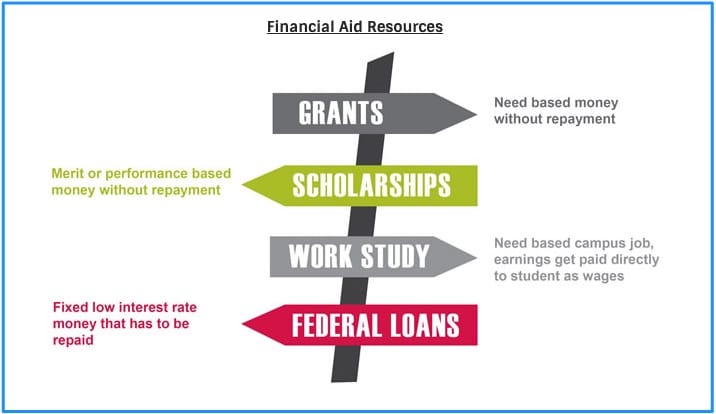
Financial Aid vs. Scholarships
Continuing from our exploration of grants and scholarships, it's essential to differentiate between financial aid as a broader concept and scholarships as a specific type of funding. Understanding these distinctions can help students navigate their options effectively.
- Definition of Financial Aid: Financial aid encompasses all forms of funding available to help students pay for their education. This includes scholarships, grants, loans, and work-study programs. Essentially, it's any financial support that assists students in affording higher education.
For instance, a student might apply for financial aid that includes a combination of a scholarship for academic merit, a federal grant based on financial need, and a subsidized loan to cover remaining expenses.
- Specificity of Scholarships: Scholarships are a subset of financial aid, specifically awarded based on merit, qualifications, or specific criteria. Unlike loans, they don’t require repayment and can significantly reduce the overall cost of college.
- Application Processes:
- Financial aid applications often require the FAFSA, which assesses a student's financial situation. In contrast, scholarship applications may focus on different criteria, such as essays, recommendations, and academic achievements.
By understanding the distinction between financial aid and scholarships, students can effectively assess their funding options and tailor their applications to maximize their educational financing opportunities.

Scholarships
Transitioning from the broader concept of financial aid, scholarships specifically target students by providing funds that do not need to be repaid, often based on criteria like merit, talent, or demographics. Understanding the different types of scholarships available can enhance your search for funding.
- Types of Scholarships:
- Merit-Based Scholarships: Awarded based on academic achievements, skills, or talents. For example, a student with outstanding GPA or a strong athletic background may apply for such awards.
- Need-Based Scholarships: Focus on students who demonstrate financial need, helping those who might struggle to afford tuition.
- Field-Specific Scholarships: These scholarships support students pursuing degrees in certain areas, like STEM or the arts.
- Application Components:
- Essays: Many scholarships require personal essays that reflect your goals, values, and experiences. Be genuine and reflective when writing about your journey.
- Recommendations: Strong letters from teachers or community leaders can strengthen your application by providing third-party validation of your achievements.
For instance, a high school senior interested in engineering may seek out both merit-based scholarships for academic excellence and field-specific scholarships targeting future engineers. By proactively researching and applying for various scholarships, students can significantly reduce their financial burdens while pursuing their education.

How to Appeal a Denied Scholarship Application
Building on our discussion about scholarships, it’s important to understand that not every application will be successful. If you find yourself facing a denied scholarship application, don’t lose hope; there are steps you can take to appeal the decision.
- Review the Denial Letter: Start by thoroughly reading the denial letter to understand the reasons for your application’s rejection. This information can help you address specific concerns during your appeal.
- Gather Supporting Documents: Compile any additional documents or evidence that may strengthen your case. This could include updated transcripts, new letters of recommendation, or additional achievements you’ve accomplished since your initial application.
- Write a Formal Appeal Letter: Draft a respectful and concise appeal letter addressed to the scholarship committee. Clearly explain why you believe your application deserves reconsideration, referencing any new or previously overlooked supporting materials.
For example, a student who had incomplete test scores at the time of application might highlight improved grades or recent accomplishments that reflect their capabilities better.
- Contact the Scholarship Provider: If possible, engage in dialogue with the scholarship provider to discuss your appeal. This can not only clarify your understanding of the decision but also demonstrate your commitment to pursuing the scholarship.
By effectively appealing a denied scholarship application, you may enhance your chances of receiving the financial assistance needed to pursue your educational goals, turning an initial setback into an opportunity for success.

How to Report Scholarship Fraud
Following our discussion on appealing denied scholarship applications, it's crucial to be vigilant and know how to report scholarship fraud. Unfortunately, scams targeting students can be common, and knowing the proper steps to take can protect you and others.
- Identify Signs of Fraud: Be aware of red flags, such as:
- Promises of guaranteed scholarships for a fee.
- Pressure to act quickly without adequately reviewing the terms.
- Poorly written websites or offers lacking credible contact information.
For instance, a student might encounter a scholarship scam that requires an upfront payment or personal information before revealing any details about the scholarship.
- Gather Evidence: If you suspect fraud, collect evidence such as emails, websites, and communication details. Documenting this information will support your report.
- Report to Authorities:
- Federal Trade Commission (FTC): You can submit a complaint on their website, detailing the fraudulent scholarship offer.
- State Attorney General’s Office: Most states have resources to handle consumer fraud, and reporting it can help prevent others from falling victim.
- Inform Your School’s Financial Aid Office: Notify the financial aid office at your school. They might also track similar reports and can guide other students.
By knowing how to report scholarship fraud, you can help create a safer educational funding environment, protecting not just your interests but also those of future students.

Understanding the Terms and Conditions of a Scholarship
Transitioning from discussions about reporting scholarship fraud, understanding the terms and conditions of a scholarship is vital before accepting any award. These details outline the expectations and responsibilities that come with receiving financial support for your education.
- Read the Fine Print: Always thoroughly review the scholarship’s terms to understand the specific requirements. Common aspects to look out for include GPA maintenance, enrollment status, and renewal conditions.
For example, some scholarships may stipulate that you must maintain a specific GPA each semester to continue receiving funds.
- Know the Funding Amount and Coverage: Understand what the scholarship covers, whether it’s full tuition, partial fees, or additional costs like books and supplies. Some scholarships may also have caps on the funding amounts for each academic year.
- Be Aware of Renewal Procedures: Many scholarships require a renewal process after the first year. Familiarize yourself with what documentation or actions you'll need to take to keep your scholarship active each year.
- Understand Reporting Requirements: Some scholarships require recipients to report their academic progress or submit certain forms to the awarding organization. Missing these deadlines can jeopardize your funding.
By comprehensively understanding the terms and conditions of a scholarship, you can ensure you meet all requirements and avoid any surprises that could affect your academic journey.

How to Use Scholarship Funds Effectively
Following our discussion on understanding the terms and conditions of a scholarship, it’s crucial to know how to use scholarship funds effectively to maximize their impact on your education. Managing these resources wisely can alleviate financial stress and enhance your college experience.
- Create a Budget: Start by outlining your expected expenses, including tuition, fees, books, and living costs. This helps you allocate your scholarship funds appropriately. For instance, if you have a scholarship of $5,000, clearly categorize how much will go toward tuition versus textbooks and supplies.
- Prioritize Educational Expenses: Use scholarship funds first for essential educational costs. This priority ensures you utilize the money for its intended purpose, such as tuition payments or required course materials, before spending on non-educational expenses.
- Track Your Spending: Keep a detailed record of how you spend your scholarship funds. This can include saved receipts, invoices, and bank statements that help you analyze your budgeting effectiveness and allow for adjustments when necessary.
- Save for Future Needs: If possible, set aside a portion of your scholarship funds for unexpected expenses, such as unforeseen fees or additional course materials that may arise during the semester.
For example, reserving $500 for contingencies can provide peace of mind in case of unexpected financial demands. By using scholarship funds effectively, you can ensure that your educational investment yields the best possible returns, enabling you to focus on your studies without unnecessary financial burden.

Online Resources for Scholarship Applicants
Transitioning from the effective use of scholarship funds, utilizing online resources can significantly enhance your search and application process. Many invaluable platforms and tools exist to help scholarship applicants access funding opportunities and streamline their applications effectively.
- Scholarship Search Engines:
- Websites like Fastweb, Cappex, and Scholarships.com offer extensive databases of scholarships based on your personal profile, academic achievements, and interests. These platforms can save you time by matching you with relevant opportunities.
- Financial Aid Websites:
- The College Board and Federal Student Aid provide comprehensive guides on searching for scholarships and understanding financial aid. They also offer resources to help you complete the FAFSA, ensuring you maximize your funding potential.
- Online Forums and Communities:
- Joining online communities such as Reddit’s r/scholarships or specific Facebook groups can provide real-time advice and experiences from other scholarship applicants. You might find insights on lesser-known scholarships or tips for writing compelling essays.
- Webinars and Workshops:
- Many educational organizations and scholarship foundations host webinars that offer tips on applying for scholarships, writing essays, and preparing for interviews. Participating in these can enhance your knowledge and confidence.
For example, a student attending a workshop may gain unique resume tips that help them stand out in applications. By leveraging these online resources, you can navigate the scholarship application process more effectively, increasing your chances of securing the financial aid necessary to achieve your academic goals.

Networking Opportunities Through Scholarship Programs
Building on the importance of utilizing online resources, scholarships offer valuable networking opportunities that can significantly enhance your academic and professional journey. Connecting with peers, mentors, and industry professionals through scholarship programs can open doors for future success.
- Connecting with Other Scholars:
- Many scholarships create a community among recipients, allowing you to engage with fellow students who share similar goals and experiences. This network can provide support, motivation, and camaraderie throughout your educational journey.
- Mentorship Opportunities:
- Scholarship programs often pair recipients with mentors from their field of study. Mentors can offer guidance, share valuable insights, and help you navigate career paths. Building relationships with mentors can lead to internships, job openings, or research opportunities.
- Access to Alumni Networks:
- Many scholarships have established alumni networks that you can tap into. These alumni often provide career advice, job leads, and professional connections. For instance, an engineering scholarship might connect you to successful engineers eager to share their experiences.
- Participation in Events and Workshops:
- Scholarship programs may host networking events, workshops, or conferences where recipients can meet industry leaders and professionals. Attending these events can expand your horizons and create potential collaborators or employers.
For example, a student who attends a scholarship-funded leadership conference may find not only inspiration but also key contacts in their prospective field. By embracing the networking opportunities that arise from scholarship programs, students can build essential relationships that enhance both their educational and career prospects, paving the way for future triumphs.

The Role of Social Media in Finding Scholarships
Transitioning from the importance of networking opportunities, social media has become a powerful tool in the hunt for scholarships. Platforms like Facebook, Twitter, and LinkedIn provide connectivity and resources that can enrich your scholarship search.
- Finding Scholarship Groups and Pages:
- Many organizations and schools create dedicated pages or groups on Facebook or LinkedIn to share scholarship opportunities. For instance, joining local scholarship groups can instantly connect you with community-specific funding sources.
- Following Relevant Hashtags:
- On Twitter and Instagram, using hashtags like #Scholarships, #FinancialAid, or #CollegeFunding can help you discover new scholarship announcements and tips. Regularly checking these hashtags ensures you stay updated on current opportunities.
- Engaging with Educational Influencers:
- Many education-focused influencers and organizations share scholarship advice and resources on platforms like Instagram and YouTube. Engaging with their content can provide you with insights on where to apply and how to make your applications stand out.
- Connecting with Alumni:
- Social media can also provide paths to alumni who have received scholarships. These connections might offer first-hand experiences, tips, and guidance on applying, as well as their success stories that can inspire you.
For example, a student may find a former scholarship recipient on LinkedIn who is willing to offer advice or assistance in navigating the application process. By strategically leveraging social media in your search for scholarships, you can uncover hidden opportunities and build connections that may greatly benefit your educational pursuits.

Building a Strong Academic Profile for Scholarship Success
Following our discussion on leveraging social media for finding scholarships, building a strong academic profile is vital for scholarship success. A well-rounded academic record can significantly enhance your competitiveness when applying for various funding opportunities.
- Maintain High Grades:
- Consistently achieving good grades demonstrates your commitment and ability to succeed in an academic environment. Many scholarships have GPA requirements, so striving for excellence can help you meet or exceed these standards.
- Engage in Challenging Courses:
- Taking advanced placement (AP) or honors courses not only showcases your academic prowess but also prepares you for college-level challenges. Admissions committees often look favorably on students who seek out rigorous coursework.
- Involvement in Extracurricular Activities:
- Balancing academics with extracurricular activities demonstrates strong time management and leadership skills. Whether it’s joining clubs, participating in sports, or engaging in community service, these activities can enrich your profile and make your application stand out.
For example, a student involved in the debate club may highlight critical thinking and public speaking skills, appealing attributes for many scholarship committees.
- Develop Relationships with Teachers:
- Building strong relationships with educators can provide you with valuable mentorship and insightful letters of recommendation. Their knowledge of your academic journey and character can bolster your scholarship applications.
By focusing on building a strong academic profile, students can improve their chances of securing scholarships and ultimately securing the funding necessary to achieve their educational objectives.

Extracurricular Activities That Enhance Scholarship Applications
Continuing from the importance of building a strong academic profile, actively engaging in extracurricular activities can greatly enhance your scholarship applications. These activities reflect your personality, interests, and commitment, making you a more appealing candidate to scholarship committees.
- Leadership Roles:
- Taking on leadership positions in clubs or organizations demonstrates initiative, responsibility, and the ability to motivate others. For example, serving as president of a student council or captain of a sports team can showcase your leadership skills.
- Community Service:
- Volunteering for local charities or community organizations highlights your commitment to giving back. Many scholarships prioritize candidates who show a dedication to community service, making this a valuable experience to include on your application.
- Clubs and Organizations:
- Participating in subject-specific clubs, like math or science clubs, can reflect your interests and dedication to your field of study. It also shows scholarship committees that you pursue passions outside of the classroom.
- Athletics and Arts:
- Involvement in sports or the performing arts can demonstrate teamwork, discipline, and creativity. For example, a student who plays in a band or participates in theater can highlight their commitment to the arts alongside academic achievements.
For instance, a student actively involved in environmental clubs may apply for scholarships focused on sustainability and conservation.
- Competitions and Events:
- Participating in academic competitions, such as science fairs, debate tournaments, or writing contests, can help you stand out with tangible achievements.
By strategically participating in extracurricular activities, students can enhance their scholarship applications, showcasing a well-rounded character that appeals to scholarship committees looking for dedicated and proactive individuals.

Volunteering and Its Impact on Scholarship Opportunities
Building on the role of extracurricular activities, volunteering can significantly enhance your scholarship opportunities. Engaging in community service not only enriches your personal growth but also makes your scholarship applications more competitive by showcasing your commitment to social responsibility.
- Demonstrating Commitment:
- Scholarships often seek candidates who show a genuine interest in their communities. Regular volunteering illustrates your dedication to making a positive impact, which is attractive to scholarship committees.
For example, a student volunteering at a local shelter might highlight their role in organizing food drives, showcasing leadership and empathy—qualities highly valued in scholarship recipients.
- Expanding Skill Sets:
- Volunteering allows you to acquire valuable skills such as teamwork, communication, and problem-solving, all of which can be articulated in your scholarship applications and essays.
- Networking Opportunities:
- Engaging with various organizations can build valuable connections with community leaders and fellow volunteers. These networks can sometimes lead to scholarship opportunities or recommendations from influential individuals.
- Tangible Experiences:
- Many scholarships require applicants to describe their experiences and motivations. Volunteering provides concrete stories that highlight personal growth and commitment that can be compelling in essays or interviews.
By actively participating in volunteer work, students not only contribute positively to society but also enhance their scholarship prospects, making them more attractive candidates for financial support.

The Importance of Academic Transcripts in Scholarship Applications
Continuing from our discussion on volunteering, academic transcripts play a crucial role in scholarship applications. They provide a comprehensive overview of your academic performance and demonstrate your dedication to your education, making them a key component of your application package.
- Reflecting Academic Achievement:
- Transcripts showcase your grades over time, highlighting your consistent effort and performance in various subjects. Strong grades in relevant coursework, such as advanced classes in your field of interest, can significantly bolster your application.
For example, a student applying for a science scholarship may want to ensure that their transcript reflects high marks in biology and chemistry to illustrate their commitment to the field.
- Demonstrating Improvement:
- If you’ve experienced academic challenges and have shown improvement over time, your transcripts can tell that story. Scholarship committees often appreciate resilience and the ability to overcome obstacles, exemplified in a timeline of grades.
- Meeting Eligibility Requirements:
- Many scholarships have specific GPA requirements. Ensuring that your transcripts meet these criteria is vital to avoid disqualification from opportunities you’re interested in.
- Supporting Your Narrative:
- When writing your personal statement or essays, referencing your academic transcripts can reinforce claims about your capabilities and ambitions. It allows you to connect your narrative with demonstrated academic success.
By focusing on maintaining a strong transcript, students can enhance their scholarship applications and effectively communicate their dedication to achieving their educational objectives.

How to Choose the Right Recommender for Your Scholarship Application
Transitioning from the importance of academic transcripts, selecting the right recommender can make a significant difference in your scholarship application. A strong letter of recommendation can provide insights into your character, achievements, and potential, enhancing your overall profile.
- Identify Relevant Experiences:
- Choose someone who knows you well and can comment specifically on your strengths and achievements. This might be a teacher of a subject relevant to your field of study or a supervisor from a volunteer position.
For example, if you’re applying for a scholarship in environmental science, a recommendation from your biology teacher could highlight your academic prowess and passion for related subjects.
- Consider Their Position:
- Aim to select recommenders who hold respected roles in their field or the educational community. A letter from an influential figure can carry more weight and lend credibility to your application.
- Look for Personal Connection:
- Ideally, your recommender should be someone who can share personal anecdotes about your work ethic or character. This personal touch can make their letter stand out and resonate with the scholarship committee.
- Communicate Your Goals:
- When asking for a recommendation, share your scholarship objectives and why you’re pursuing them. This information allows the recommender to tailor their letter to align with your aspirations and the scholarship’s values.
By carefully selecting the right recommender for your scholarship application, you can enhance your chances of receiving financial aid and showcasing your strengths effectively to the committee.
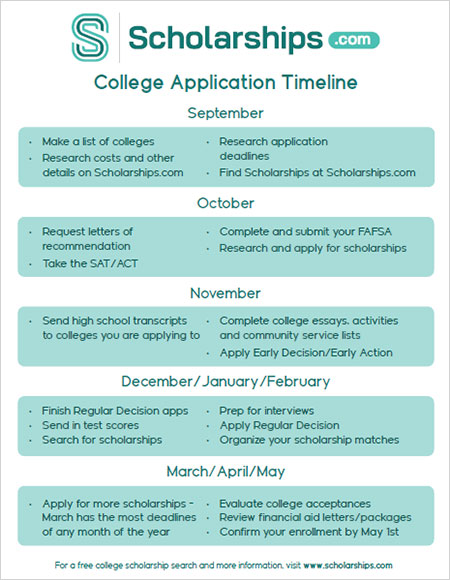
Balancing Work, Study, and Applying for Scholarships
Building on the importance of choosing the right recommender, managing the delicate balance of work, study, and scholarship applications can be challenging. However, with effective time management and planning, you can successfully juggle these responsibilities.
- Create a Schedule:
- Use a planner or digital calendar to map out your commitments. Block out time for work, classes, study sessions, and dedicated scholarship application periods. For instance, setting aside specific hours each week solely for scholarship essays can provide structure and focus.
- Prioritize Tasks:
- Identify which scholarships are most appealing and prioritize them based on deadlines and requirements. For example, if one scholarship has an early deadline but requires more extensive documentation, approach that task first to avoid last-minute stress.
- Utilize Breaks Wisely:
- Make the most of short breaks or downtime by reviewing scholarship essays, brainstorming ideas, or organizing application materials. Small bursts of productivity can accumulate and help you stay on track without overwhelming your schedule.
- Communicate with Your Employer:
- If you’re working while studying, communicate your academic responsibilities with your employer. Many employers appreciate students’ commitments and may offer flexible schedules during peak application seasons.
For instance, many students find it easier to work part-time during the summer when they can devote more time to their studies and scholarship applications without conflicting obligations. By implementing these strategies, students can effectively balance work, study, and scholarship applications, enhancing their chances of achieving their educational goals while managing their responsibilities.

Strategies for Winning Competitive National Scholarships
Transitioning from balancing work and study, winning competitive national scholarships requires a proactive and strategic approach. With many applicants vying for limited funds, it’s important to differentiate yourself through focused efforts and meticulous preparation.
- Research Thoroughly:
- Invest time in understanding the specific values and criteria of each scholarship. Review past winners’ profiles and applications to identify what made them stand out. For example, a scholarship that values leadership may favor candidates with significant community service experience.
- Craft Tailored Essays:
- Customize your essays for each application. Align your personal stories with the scholarship's mission, showing how your goals and experiences resonate with their values. Use compelling anecdotes to illustrate your dedication and journey, making your application memorable.
- Highlight Leadership and Impact:
- Showcase leadership roles and the impact of your contributions in your community. For instance, if you've initiated a project, discuss its outcomes and how it has positively affected others. Scholarship committees often seek individuals who will not only benefit from the funds but also give back.
- Obtain Strong Recommendations:
- Secure letters from recommenders who can provide specific examples of your skills and achievements. A recommender who can articulate your contributions and character can significantly enhance your application.
By implementing these strategies, you can improve your chances of securing competitive national scholarships, positioning yourself as a strong candidate who stands out in a crowded field.

The Impact of GPA on Scholarship Eligibility
Continuing from our discussion on strategies for winning competitive national scholarships, your GPA plays a significant role in determining scholarship eligibility. A solid academic record can greatly influence your chances of securing funding for your education.
- Minimum GPA Requirements:
- Many scholarships set a minimum GPA requirement that applicants must meet. This standard may vary significantly from one scholarship to another. For instance, some merit-based scholarships might require a GPA of 3.5 or higher, while need-based awards may be slightly more lenient.
- GPA as a Reflection of Commitment:
- Scholarship committees often view GPA as a reflection of your dedication and ability to succeed in an academic setting. Consistently high grades suggest that you can handle college-level coursework, making you a more appealing candidate for funding.
- Impact on Competitive Scholarships:
- For competitive scholarships, higher GPAs can increase your chances of standing out among applicants. They send a message that you are not only academically inclined but also capable of maintaining balance in your studies.
For example, a student with a GPA of 3.8 applying for a scholarship aimed at aspiring engineers might have an edge over competitors with lower GPAs, particularly for scholarships related to STEM fields.
- Strategies for Improvement:
- If your GPA is currently below required thresholds, consider focusing on strategies for improvement, such as seeking tutoring, forming study groups, or dedicating more time to homework and projects.
By understanding the impact of GPA on scholarship eligibility, students can prioritize their academic performance to enhance their chances of securing valuable funding for their education.
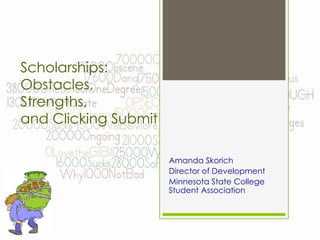
How to Leverage Unconventional Skills in Your Scholarship Application
Transitioning from the impact of GPA on scholarship eligibility, showcasing your unconventional skills can differentiate you from other applicants and strengthen your scholarship application. Unique talents and experiences can provide insights into your character and potential contributions.
- Identify Your Unique Skills:
- Think critically about skills that set you apart—whether they involve creative pursuits, technical proficiencies, or soft skills like conflict resolution or public speaking. For example, if you’re skilled at graphic design or coding, these can be powerful assets to highlight.
- Connect Skills to the Scholarship’s Values:
- Align your unconventional skills with the goals of the scholarship. If applying for a service-oriented scholarship, mention how your skills help you contribute to community projects or initiatives. A student who volunteers as a graphic designer for local charities can demonstrate real-world applications of their talent.
- Use Personal Stories:
- Include personal anecdotes that illustrate how you've used these skills in meaningful ways. For instance, if you self-taught an instrument and performed at community events, explain how that experience taught you resilience and discipline—qualities that scholarship committees value.
- Show Your Growth:
- Highlight how these skills have contributed to your growth or influenced your academic and professional aspirations. Discussing how your creative problem-solving skills led to an innovative project can make a strong impact.
By effectively leveraging unconventional skills in your scholarship application, you can present a well-rounded profile that not only demonstrates your qualifications but also reflects your individuality and potential contributions to the scholarship community.

Understanding the Selection Criteria for Different Types of Scholarships
Building on the discussion about leveraging unconventional skills, understanding the selection criteria for different types of scholarships is crucial for tailoring your application. Each scholarship may prioritize different factors, so knowing what to focus on can enhance your chances of success.
- Merit-Based Scholarships:
- These typically prioritize academic achievements, standardized test scores, and leadership roles. For example, a student applying for a national merit scholarship should showcase their high GPA, involvement in clubs, and any awards received.
- Need-Based Scholarships:
- These scholarships focus on the financial need of the applicant, often requiring detailed financial documentation. Being clear and honest about your financial circumstances is essential. Students may also be asked to demonstrate how they plan to use the funds.
- Field-Specific Scholarships:
- For scholarships aimed at particular fields, such as STEM or the arts, applicants should highlight relevant coursework, projects, and experiences that connect to their chosen field. For instance, an aspiring engineer may want to emphasize their participation in robotics competitions or internships.
- Diversity and Inclusion Scholarships:
- Many organizations offer scholarships that aim to promote diversity. Applicants should share personal stories that illustrate their backgrounds and contributions to inclusivity. This might include volunteering with underrepresented communities or leading initiatives that foster diversity.
By thoroughly understanding the selection criteria for different types of scholarships, you can effectively tailor your applications and present your strongest qualifications, significantly increasing your chances of receiving the funding you need.

The Role of Financial Need in Awarding Need-Based Scholarships
Transitioning from the selection criteria for different types of scholarships, financial need plays a pivotal role in awarding need-based scholarships. These scholarships aim to assist students who may not otherwise afford the cost of education, making understanding this aspect crucial for applicants.
- Assessment of Need:
- Most need-based scholarships require applicants to demonstrate financial need through detailed financial information, typically submitted via the Free Application for Federal Student Aid (FAFSA) or other specific forms. This documentation helps scholarship committees evaluate your financial situation accurately.
- Evaluating Family Contributions:
- When assessing need, scholarship committees often consider a family’s income, assets, and number of dependents. For example, a student from a single-income household may present a stronger case for need compared to a student from a dual-income family.
- Impact of Circumstances:
- Unexpected life circumstances, such as job loss or medical expenses, can influence your financial need. Including a personal statement that explains these situations can add context to your application and illustrate why you need support.
- Broadening Access to Education:
- Need-based scholarships not only alleviate financial burdens but also promote diversity and inclusion within educational institutions. By providing funds to deserving candidates, these scholarships strive to ensure that financial barriers do not limit access to educational opportunities.
By understanding the role of financial need in awarding scholarships, students can approach their applications with clarity, ensuring they celebrate their unique circumstances while effectively conveying their need for assistance in pursuing their education.

How to Identify Legitimate Minority-Specific Scholarship Opportunities
As we move forward from discussing the role of financial need, identifying legitimate minority-specific scholarship opportunities is crucial for ensuring you secure funding tailored to your background and experiences. The right scholarships can provide essential support while fostering diversity.
- Research Reputable Sources:
- Start by looking for scholarships provided through established organizations, foundations, and educational institutions. Websites like the United Negro College Fund (UNCF), Hispanic Scholarship Fund, and APIA Scholars are reputable sources that offer minority-specific scholarships.
- Check Accreditation:
- Ensure that the scholarship is awarded by accredited organizations or educational institutions. This can usually be verified on their official website, where you can find their mission, history, and past awardees.
- Read Reviews and Testimonials:
- Look for feedback from previous scholarship recipients. Websites, social media pages, or community forums can provide insights into the legitimacy of a scholarship program. If past applicants have had positive experiences, it’s likely a legitimate opportunity.
- Beware of Red Flags:
- Be cautious of scholarships that require payment to apply or promise guaranteed awards without a proper application process. Legitimate scholarships do not ask for fees upfront and usually require essays or interviews for consideration.
For example, a student who receives scholarship offers asking for application fees should approach those offers with skepticism, as genuine scholarships focus on the merit and need of applicants. By following these steps to identify legitimate minority-specific scholarship opportunities, students can ensure they pursue funding that is not only safe but also beneficial in offsetting the costs of their education.

The Benefits of Applying Early for College-Specific Scholarships
Transitioning from identifying legitimate minority-specific scholarship opportunities, applying early for college-specific scholarships can provide significant advantages in your pursuit of financial aid. Getting ahead in the application process can enhance your chances of securing funding for your education.
- Increased Competition:
- Applying early often means facing less competition. Many students tend to wait until the final deadline, so getting your application in early allows you to stand out among a smaller group of applicants.
- More Time for Refinement:
- Early applications give you the advantage of more time to review and refine your essays and supporting documents. This allows you to present your best work and make any necessary adjustments based on feedback from peers or mentors.
For instance, a student who submits their application a couple of weeks before the deadline can use that time to seek input from teachers or advisors on their personal statement, strengthening their narrative.
- Demonstrating Enthusiasm:
- Submitting your application early shows a strong interest in the college’s program and demonstrates your commitment to pursuing education at that institution. Scholarship committees often appreciate candidates who are proactive and organized.
- Potential for Early Decisions:
- Some colleges may offer rolling admissions or early decisions. By applying early, you may hear back sooner regarding scholarship awards, allowing you to make informed decisions about your education plans.
By applying early for college-specific scholarships, students can leverage these benefits to improve their chances of securing necessary funding while showcasing their dedication to their chosen educational paths.

The Importance of Following Instructions in Scholarship Applications
Continuing from the benefits of applying early for college-specific scholarships, meticulously following instructions in scholarship applications is critical. Adhering to guidelines ensures that your application is complete and meets the criteria set by the scholarship committee.
- Adhering to Requirements:
- Scholarships often contain specific requirements regarding essay length, document formats, and submission procedures. Failing to respect these details can result in your application being disqualified before it's even reviewed.
For instance, if a scholarship specifies a 500-word essay but your submission exceeds this limit, you might automatically be removed from consideration, regardless of the quality of your writing.
- Demonstrating Attention to Detail:
- Paying attention to and following application instructions reflects your diligence and professionalism. Scholarship committees notice applicants who show they can follow guidelines carefully, which speaks volumes about their suitability for funding.
- Avoiding Common Pitfalls:
- Many applicants inadvertently sabotage their chances by ignoring instructions. By taking the time to read and understand the requirements thoroughly, you can avoid simple mistakes, such as submitting the wrong documents or not including all necessary materials.
- Using a Checklist:
- Creating a checklist of requirements for each scholarship application can help ensure you don’t overlook anything. This approach allows you to double-check that all components, such as essays, transcripts, and recommendation letters, are included before submission.
By recognizing the importance of following instructions in scholarship applications, students can enhance their chances of success and demonstrate their commitment to securing the financial support they need for their education.

How to Highlight Leadership Skills in Your Application
Transitioning from the importance of following instructions, highlighting your leadership skills in your scholarship application can significantly enhance your profile. Strong leadership experiences not only demonstrate your capability but also indicate your potential for making a positive impact in your community.
- Identify Relevant Experiences:
- Begin by reflecting on your past experiences where you took the lead. This could include roles in student government, club presidencies, team captaincy, or organizing community events. Think about how these roles allowed you to influence others and achieve goals.
For example, if you organized a charity event as the president of your school's environmental club, that showcases your ability to motivate peers and manage projects effectively.
- Use Specific Examples:
- When writing your application essays or personal statements, provide concrete examples. Describe a challenge you faced in a leadership role and how you overcame it, detailing the skills you employed, such as communication, problem-solving, or teamwork.
- Quantify Your Impact:
- Whenever possible, quantify your achievements to add weight to your claims. For instance, mention how many people participated in an initiative you led or how much money you raised for a cause.
- Connect Leadership to Your Goals:
- Articulate clearly how your leadership experiences align with your academic and career aspirations. Scholarship committees appreciate candidates who can link their past experiences to their future ambitions.
By effectively highlighting your leadership skills in your application, you position yourself as a candidate dedicated to positively impacting your community, increasing your chances of standing out to scholarship committees.

Using Technology to Streamline the Scholarship Application Process
Building on the importance of highlighting leadership skills, leveraging technology can significantly streamline your scholarship application process. Various tools and resources can help you stay organized, enhance your submissions, and increase your chances of success.
- Utilize Scholarship Search Engines:
- Websites like Fastweb, Scholarships.com, and Cappex can help you find scholarships tailored to your interests and qualifications. By creating a profile, you can get matched with opportunities, saving time on research.
- Organizational Tools:
- Use productivity tools like Trello, Evernote, or Google Sheets to manage your applications. Create checklists for required documents, deadlines, and follow-up tasks. This organizational method keeps all your scholarship-related information in one place, reducing stress.
For example, a student using Google Sheets can easily track submission dates and status for each scholarship, ensuring nothing is overlooked.
- Document Management Apps:
- Tools such as Google Drive or Dropbox allow you to store and access your documents from anywhere. Organize your essays, transcripts, and recommendation letters in folders for quick access when needed.
- Writing and Editing Tools:
- Platforms like Grammarly, or Hemingway Editor can help polish your scholarship essays by providing grammar suggestions and readability analysis. Good writing is key in scholarship applications, and these tools can enhance your submissions.
- Set Reminders:
- Use digital calendars or task management apps to set reminders for application deadlines, follow-ups, or interviews. Timely reminders ensure that you remain proactive throughout the scholarship application journey.
By incorporating technology into your scholarship application process, you can enhance your organization and efficiency, ultimately leading to more successful applications and one step closer to securing vital funding for your education.

How to Handle Rejection from a Scholarship Program
Following our discussion on using technology to streamline the scholarship application process, it’s essential to know how to handle rejection from a scholarship program. Rejection can be disheartening, but with the right approach, you can turn it into a learning opportunity.
- Acknowledge Your Feelings:
- It’s natural to feel disappointed after receiving a rejection; allow yourself to process those emotions. Talk to friends, family, or mentors about how you feel; this support can provide comfort during tough moments.
- Request Feedback:
- If possible, reach out to the scholarship committee and ask for feedback on your application. Understanding their decision can provide valuable insights into areas for improvement, helping you strengthen future applications.
For example, if the committee notes that your essay lacked specific details, you can work on better articulating your experiences in the future.
- Reflect on Your Application:
- Take time to review your application critically. Identify areas where you can improve, whether it’s crafting stronger essays, seeking better recommendations, or showing more involvement in relevant activities.
- Stay Positive and Persistent:
- Remember that rejection is a part of the scholarship application process. Many successful students have faced multiple rejections before securing funding. Maintaining a positive attitude and persistence is key.
- Explore Other Opportunities:
- Instead of dwelling on the rejection, redirect your energy toward exploring other scholarship opportunities. Broaden your search and consider local or less competitive scholarships as viable options.
By adopting these strategies to cope with scholarship rejection, you can turn this setback into a stepping stone toward future success, ultimately paving your way to securing the funding you need for your education.
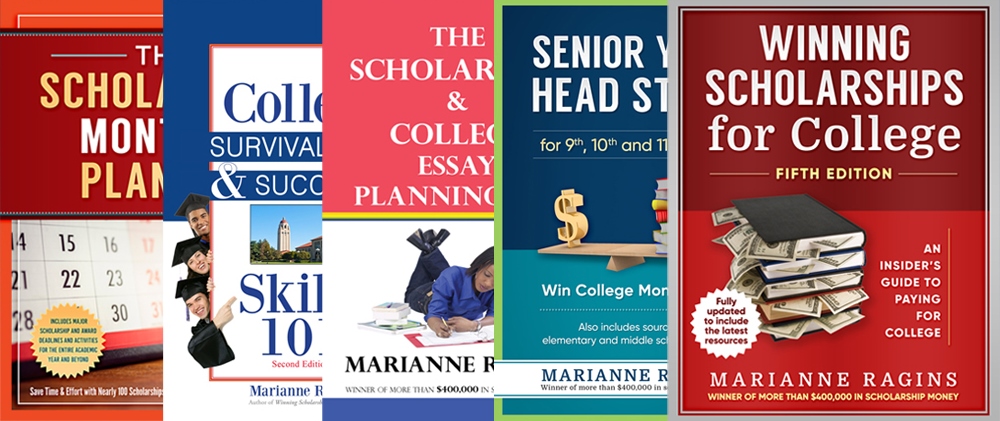
The Benefits of Attending Scholarship Workshops and Seminars
Transitioning from coping with scholarship rejections, attending scholarship workshops and seminars can enhance your understanding and skills in navigating the application process. These events provide valuable insights and resources to empower you in your scholarship pursuit.
- Gain Expert Advice:
- Workshops often feature financial aid officers, scholarship professionals, or previous scholarship winners who share insider tips on crafting successful applications. Gaining firsthand knowledge can demystify the process and offer new strategies for your applications.
- Networking Opportunities:
- Attending these events allows you to connect with other students who are also seeking scholarships. Building relationships with like-minded individuals can lead to potential partnerships or motivation throughout the application process.
For example, a student attending a seminar may meet peers who share information about lesser-known scholarships, expanding available opportunities.
- Access to Resources:
- Many workshops provide materials, templates, and tools designed to assist in the scholarship application process. Utilizing these resources can simplify the often complex application requirements.
- Skill Development:
- Workshops can also include sessions on writing strong essays, preparing for interviews, or understanding financial aid packages. Developing these skills can improve your application quality and complete your profile as a candidate.
- Inspiration and Motivation:
- Hearing success stories from previous awardees can serve as inspiration, reminding you that many students have overcome similar challenges to secure funding. This encouragement can help you stay motivated throughout your search.
By attending scholarship workshops and seminars, you can gain crucial skills, resources, and connections that will bolster your chances of acquiring important financial aid for your education.

Creating a Timeline for Your Scholarship Search Process
Following the benefits of attending scholarship workshops and seminars, creating a timeline for your scholarship search process is essential for staying organized and proactive. A well-structured timeline can help you efficiently manage your applications and meet deadlines.
- Start Early:
- Begin your scholarship search at least six months before deadlines. Early planning provides ample time to identify opportunities and gather necessary materials. For instance, if you aim to enter college in the fall, start researching scholarships in the spring.
- List Key Dates:
- Create a calendar with important dates, including scholarship deadlines, application submission dates, and follow-up reminders. Color-coding deadlines based on urgency can help prioritize tasks visually.
For example, marking scholarship deadlines in red and early reminders in green can create a clear visual representation of what needs to be prioritized.
- Break Down Tasks:
- Divide the application process into manageable tasks—research, essay writing, gathering recommendations, and submitting applications. Assign specific time frames for each task to prevent last-minute stress.
- Set Milestones:
- Include milestones on your timeline, such as completing your first draft of an essay or securing all required recommendation letters. Celebrating small achievements can keep you motivated and provide a sense of progress.
- Review and Adjust:
- An effective timeline is flexible. Regularly review your progress and adjust deadlines as necessary. If you’ve identified new scholarships or changed your application strategy, revise your timeline accordingly.
By creating and adhering to a well-structured timeline for your scholarship search process, you can facilitate a more organized and less stressful approach, ultimately increasing your chances of securing funding for your education.

Understanding the Role of Essays in Merit-Based Scholarship Applications
Transitioning from the importance of creating a timeline for your scholarship search process, the essays in merit-based scholarship applications play a crucial role in portraying your individuality and potential. These essays are often your chance to shine beyond academics.
- Showcase Your Unique Story:
- Essays allow you to present your personal narrative, experiences, and aspirations. This is your opportunity to share who you are beyond grades and test scores. A compelling personal story can resonate deeply with scholarship committees.
For instance, a student who reflects on overcoming challenges, such as relocating to a new country or dealing with family responsibilities, can create a powerful narrative that showcases resilience and determination.
- Demonstrate Achievements and Goals:
- Use your essay to highlight your accomplishments, showcasing how they position you as a strong candidate. Additionally, clearly articulate your future goals and how the scholarship aligns with them. For example, if you’ve led initiatives in your community, emphasize the skills gained and how they influence your career aspirations.
- Connect to the Scholarship’s Mission:
- Research the scholarship provider’s values and mission. Tailor your essay to reflect these ideals, demonstrating why you are a good fit.
- Quality Over Quantity:
- Focus on clarity and quality of writing. Avoid trying to cover too much ground; instead, choose specific experiences or achievements that clearly illustrate your points.
By understanding the vital role of essays in merit-based scholarship applications, you can craft thoughtful and impactful narratives that enhance your application and make a lasting impression on scholarship committees.

The Importance of Proofreading Your Application Materials
Transitioning from the crucial role of essays in merit-based scholarship applications, proofreading your application materials is an essential step that can significantly affect your chances of success. Attention to detail showcases professionalism and dedication to your application.
- Eliminating Errors:
- Proofreading helps catch grammatical mistakes, typos, and punctuation errors that could detract from the quality of your application. Even minor errors can make a negative impression, leading committees to question your attention to detail.
For example, a scholarship application with several spelling errors might lead reviewers to perceive you as careless, regardless of your achievements.
- Enhancing Clarity:
- Carefully reviewing your materials can improve overall clarity and coherence. Ensure your ideas flow logically, and that your essays effectively communicate your experiences and aspirations. Reading your work aloud can help identify awkward phrasing or unclear statements.
- Seeking Feedback:
- Enlist the help of trusted peers, teachers, or family members to review your application materials. Fresh eyes may spot errors you’ve overlooked and provide valuable feedback on how your writing resonates.
For instance, a friend might suggest rephrasing a sentence to make your passion shine more brightly.
- Using Tools:
- Tools like Grammarly or Hemingway Editor can assist in catching mistakes and improving readability. However, they shouldn’t replace human proofreading, as these tools might miss nuance or context that only a reader can understand.
By understanding the importance of proofreading your application materials, students can present polished and professional submissions that effectively showcase their strengths and enhance their chances of securing scholarships.

How to Stand Out in a Pool of Qualified Applicants
Building on the importance of proofreading your application materials, standing out in a pool of qualified applicants is crucial in securing scholarships against fierce competition. Unique approaches can help highlight your individuality and distinguish you from other candidates.
- Highlight Unique Experiences:
- Think about experiences that are unique to you, whether they stem from personal challenges, cultural backgrounds, or impactful community service. Sharing these personal stories can make your application memorable and relatable to the scholarship committee.
For example, a student who started an environmental club after witnessing climate issues in their community may write about that transformative experience, showcasing their passion and initiative.
- Showcase Specific Achievements:
- Rather than listing generic accomplishments, emphasize those that are quantifiable and directly relevant to the scholarship. If you raised funds for a charity, specify the amount and methods, painting a clearer picture of your impact.
- Craft a Compelling Personal Statement:
- Use your personal statement as an opportunity to reflect on your journey, values, and aspirations. A well-crafted narrative can connect emotionally with readers. Include specific examples that illustrate your growth and how you align with the scholarship's mission.
- Demonstrate Commitment:
- Use your application to show your commitment to your field of interest. This might include participation in relevant clubs, internships, or initiatives that underscore your dedication to making a difference.
For instance, a student pursuing a career in education could highlight their experience volunteering as a tutor in after-school programs, reinforcing their commitment to learning and community engagement. By focusing on these strategies, you can effectively stand out in a competitive scholarship application pool, showcasing your unique strengths and making a compelling case for why you deserve funding for your educational journey.

The Impact of Test Scores on Academic-Based Scholarships
Transitioning from the strategies for standing out in scholarship applications, test scores often play a significant role in determining eligibility for academic-based scholarships. High scores can enhance your application, showcasing your academic potential and commitment to education.
- Demonstrating Academic Readiness:
- Scholarship committees frequently use standardized test scores as a benchmark to assess applicants' academic readiness. A strong performance on tests like the SAT or ACT can indicate that you are equipped to handle college-level coursework.
For example, students with high test scores may receive merit scholarships specifically aimed at recognizing academic excellence, highlighting their ability to succeed in rigorous environments.
- Meeting Minimum Requirements:
- Many academic-based scholarships establish minimum test score thresholds. Failing to meet these criteria can eliminate candidates from consideration, regardless of other outstanding achievements. It’s essential to know these requirements before applying.
- Test Scores as a Tie-Breaker:
- In cases where applicants have similar qualifications, high test scores can serve as a differentiator. This means that even if two students have comparable GPAs and extracurricular activities, the one with superior test scores might gain an edge.
- Scholarships with Holistic Reviews:
- Some scholarships consider test scores as just one aspect of a holistic review process. While high test scores can enhance your application, personal statements, letters of recommendation, and extracurricular involvement still play a crucial role.
By understanding the impact of test scores on academic-based scholarships, students can prioritize their preparation strategies to enhance their qualifications and maximize their opportunities for financial support.

How to Demonstrate Passion in Your Personal Statement
Continuing from our discussion on the impact of test scores, demonstrating passion in your personal statement can set your application apart from others. A heartfelt expression of your motivations and commitment can make a lasting impression on scholarship committees.
- Share Personal Stories:
- Provide anecdotes that illustrate your passion for your field of study or career aspirations. For example, if you're passionate about environmental science, recount a personal experience, such as a community clean-up you organized, that ignited your interest.
- Connect Experiences to Goals:
- Clearly link your experiences to your future goals. Explain how your past experiences have shaped your aspirations, illustrating a trajectory of growth.
For instance, a student who volunteered at a children's hospital might discuss how that experience solidified their desire to pursue a career in pediatric medicine.
- Be Specific and Authentic:
- Use specific language and examples that reflect your unique perspective. Avoid generic statements; instead, focus on what truly drives you. Authenticity resonates deeply with readers.
- Discuss Challenges Overcome:
- Address any challenges you've faced related to your passion. Describing how you overcame adversity demonstrates resilience and commitment to your goals, which scholarship committees value.
For example, if you struggled to excel in a particular subject but didn’t give up, explaining that journey can highlight your dedication. By effectively demonstrating your passion in your personal statement, you can create a powerful narrative that connects with scholarship committees, enhancing your chances of securing valuable funding for your education.

The Role of Parent Involvement in the Scholarship Process
Building on the importance of demonstrating passion in your personal statement, parent involvement can significantly influence the scholarship application process. Their support and guidance can provide you with the necessary tools and encouragement to navigate this complex landscape.
- Emotional Support and Motivation:
- Having parents involved can offer emotional backing during what can often be a stressful time. They can provide reassurance and encouragement, helping you stay focused and motivated. A supportive environment can make a world of difference.
For example, a parent who checks in regularly about your progress can help keep you accountable and less overwhelmed.
- Guidance on Researching Scholarships:
- Parents can assist in searching for scholarships, especially those that may be lesser-known or local opportunities. Their experience and connections can uncover valuable leads.
- Reviewing Application Materials:
- Parents can help review your scholarship applications and essays. Their fresh eyes can catch errors or suggest improvements, ensuring your submissions are polished and compelling.
- Assistance with Financial Information:
- Completing financial aid forms often requires parental input. Their understanding of household financials can help accurately fill out necessary forms such as the FAFSA, ensuring you maximize your aid eligibility.
By actively participating in the scholarship process, parents play a vital role in helping students secure much-needed funding for their education, ultimately supporting their aspirations and helping to ease some of the application burdens.

How to Research Potential Donors or Sponsors
Transitioning from the discussion on parent involvement, researching potential donors or sponsors can significantly enhance your chances of securing funding for your education. Knowing where to look and how to approach potential sponsors is crucial for a successful search.
- Identify Relevant Organizations:
- Begin by listing organizations that align with your field of study or personal interests. For example, if you’re pursuing a career in environmental science, look for nonprofits, foundations, or businesses that focus on sustainability or conservation.
- Utilize Online Databases:
- Websites like GuideStar or Charity Navigator can provide detailed information about nonprofit organizations, including their mission, funding sources, and past scholarship programs. This research can help you determine which organizations are likely to support educational initiatives.
- Tap into Local Resources:
- Community foundations often offer scholarships funded by local donors. Reach out to your local library or community center for information on regional opportunities, and check with local businesses, as many support students in their communities.
- Network and Seek Referrals:
- Leverage your connections by asking teachers, mentors, or community leaders if they know of any potential donors or sponsors. Attending local events or workshops can open doors to networking opportunities, leading you to individuals who may be willing to contribute.
For instance, a student might connect with a local business owner at a community event who is interested in supporting local education initiatives. By effectively researching potential donors or sponsors, students can access valuable funding opportunities that align with their goals, enhancing their financial resources as they pursue their educational aspirations.

The Benefits of Joining Professional Organizations Related to Your Field
Transitioning from researching potential donors or sponsors, joining professional organizations related to your field can be immensely beneficial for students. These organizations offer a wealth of resources and opportunities to enhance your educational and career journey.
- Networking Opportunities:
- Professional organizations provide access to a network of professionals, including mentors, peers, and industry leaders. Attending conferences or local meetings can lead to valuable connections that may help you learn about internships, job opportunities, or additional scholarships.
For instance, a student in journalism might meet experienced reporters at a press club meeting, leading to internships or useful career advice.
- Access to Resources:
- Many organizations offer exclusive resources, such as scholarships, grants, internships, and educational materials. Membership often includes access to industry-specific publications, webinars, and workshops, which can enhance your knowledge and skills.
- Skill Development:
- Participating in workshops and training sessions organized by these groups can help you develop specific skills and competencies relevant to your field, making you a more competitive candidate in the job market.
- Resume Building:
- Being an active member of a professional organization signals your commitment to your field, which can be a notable addition to your resume. It shows prospective employers that you are dedicated to continuous learning and professional development.
By joining professional organizations related to your field, students can gain valuable insights, resources, and connections that not only enhance their scholarship applications but also prepare them for successful careers after graduation.

How to Use Alumni Networks to Discover New Opportunities
Transitioning from discussing the benefits of joining professional organizations, leveraging alumni networks can open doors to valuable opportunities and insights. Engaging with alumni from your school or program offers a unique advantage when searching for scholarships or employment.
- Connect Through Social Media:
- Platforms like LinkedIn are excellent for finding and connecting with alumni. Search for your school’s alumni group and reach out to individuals in your field of interest. Many alumni are willing to share their experiences and advice.
For example, a recent graduate from a local university might connect with an alumnus working in their desired industry, leading to valuable insights on job openings or further educational opportunities.
- Attend Alumni Events:
- Many schools host networking events, webinars, or reunions. Participating in these gatherings provides a chance to meet alumni face-to-face, fostering connections that could yield mentorship opportunities and job leads.
- Seek Informational Interviews:
- Don’t hesitate to request informational interviews with alumni. This allows you to ask about their career paths and gain insights into how they navigated scholarship applications and job searches in your field.
- Utilize Alumni Databases:
- Some institutions have dedicated alumni databases or career services that provide resources to connect with graduates. These can be invaluable for discovering mentorship programs, internships, and even job openings that may not be publicly advertised.
By actively engaging with alumni networks, students can uncover new scholarship opportunities, gain practical advice, and expand their professional connections, enhancing their educational journey and career prospects.

Understanding the Difference Between Fellowships and Traditional Scholarships
Transitioning from the exploration of alumni networks, understanding the distinction between fellowships and traditional scholarships is essential for students navigating financial aid. While both provide financial support for education, they have unique purposes and eligibility criteria.
- Definition and Purpose:
- Fellowships: Generally designed for advanced study or research, fellowships often target graduate students or post-graduate candidates. They may require recipients to conduct specific projects, conduct research, or engage in professional development related to their field.
For instance, a student in a research-focused master’s program might apply for a fellowship that supports their thesis research in environmental science, providing both funding and mentorship.
- Traditional Scholarships:
- Commonly awarded based on merit, need, or specific characteristics, traditional scholarships are accessible to a broader range of students. These awards typically don't require recipients to engage in any specific projects or research, focusing instead on academic achievements or community involvement.
- Application Processes:
- Fellowships often have a more rigorous application process that may involve project proposals, interviews, or letters of intent. In contrast, traditional scholarships usually require transcripts, essays, and recommendation letters.
- Funding Models:
- Fellowship funding may also include stipends for living expenses or research funding, whereas scholarships typically cover tuition fees, books, or specific educational costs.
By understanding the differences between fellowships and traditional scholarships, students can make informed decisions about which financial aid opportunities align best with their academic ambitions and career goals, paving the way for a successful educational experience.
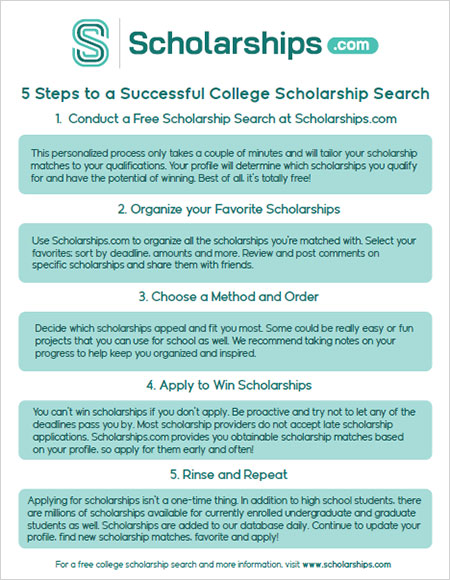
The Role of Internships in Enhancing Your Application
Transitioning from understanding fellowships and scholarships, internships play a pivotal role in enhancing your scholarship application. These experiences not only provide practical skills but also demonstrate your commitment and engagement in your chosen field.
- Demonstrating Practical Experience:
- Internships allow you to gain hands-on experience in your area of interest, which can be a significant advantage when applying for scholarships. Scholarship committees appreciate applicants who have applied theoretical knowledge in real-world settings. For example, a student applying for a business scholarship may highlight their internship at a local startup.
- Developing Relevant Skills:
- Participation in an internship helps you develop essential skills such as communication, teamwork, and problem-solving. When articulating your experiences in scholarship essays, you can detail how these skills will contribute to your future success.
- Networking Opportunities:
- Internships provide valuable networking opportunities. Building relationships with professionals in your field can result in mentorship and potential job offers, and these individuals can also serve as recommenders for your scholarship application.
For instance, a student who interned at an environmental organization might ask their supervisor for a letter of recommendation, strengthening their application.
- Illustrating Commitment:
- Highlighting your internship experience can show scholarship committees that you are proactive and dedicated to your field. It illustrates your willingness to invest time and effort into your academic and career goals.
By emphasizing internships in your scholarship applications, you can create a compelling narrative showcasing your skills, experiences, and commitment to your future career path, ultimately enhancing your overall application.

How to Showcase Cultural Competency in International Student Applications
Transitioning from the importance of internships, showcasing cultural competency in international student applications is crucial for demonstrating your ability to thrive in diverse academic environments. This skill is increasingly valued by scholarship committees as it reflects adaptability and open-mindedness.
- Highlight Cross-Cultural Experiences:
- Include experiences that have exposed you to different cultures, such as travel, studying abroad, or participating in intercultural exchange programs. Discuss specific moments that deepened your understanding of cultural differences and fostered effective communication.
For example, a student who volunteered with refugees may discuss how that experience helped them appreciate diverse perspectives while developing empathy and understanding.
- Demonstrate Language Proficiency:
- If you are multilingual or proficient in a language other than your native tongue, highlight this skill in your application. Language competency not only showcases your ability to communicate with a broader range of people but also exemplifies your commitment to cultural engagement.
- Incorporate Diverse Perspectives:
- In your essays, share how your background influences your worldview. Discuss how you plan to contribute to the cultural diversity of the campus community, such as through participation in student organizations or cultural events.
- Engage in Cultural Activities:
- Involvement in cultural clubs, festivals, or initiatives can enhance your application. Discussing these activities demonstrates your active participation in fostering intercultural understanding and cooperation.
By effectively showcasing your cultural competency in international student applications, you can demonstrate your readiness to contribute positively to a diverse academic community while appealing to scholarship committees seeking candidates who embrace inclusivity and understanding.

The Benefits of Attending College Fairs and Information Sessions
Following our discussion on showcasing cultural competency, attending college fairs and information sessions can significantly enhance your scholarship search and application process. These events provide valuable resources and insights that can inform your educational choices.
- Direct Access to Information:
- College fairs and presentations allow you to gather information directly from admissions representatives and scholarship providers. This exposure can clarify the scholarship application process, eligibility criteria, and deadlines, giving you a competitive edge.
For example, attending a college fair may connect you with a representative from a university who can explain specific scholarships available for international students.
- Networking Opportunities:
- These events also offer opportunities to meet peers who share your interests. Networking with other students can lead to valuable discussions about scholarships or tips for successful applications, creating a supportive community.
- Exploring Multiple Options:
- College fairs showcase various institutions and scholarship programs, allowing you to explore options that you may not have considered. Discovering lesser-known scholarships can expand your funding opportunities.
- Personalized Guidance:
- Many fairs offer workshops on topics such as essay writing, financial aid planning, and application strategies. Attending these can provide personalized advice and practical tips, making your applications stronger and more compelling.
By actively participating in college fairs and information sessions, you can gather essential resources, network with professionals and peers, and broaden your understanding of available scholarship opportunities, ultimately enhancing your chances of securing the funding you need for your education.

How to Utilize High School Counselors in Your Search
Transitioning from the benefits of college fairs and information sessions, high school counselors play a vital role in your scholarship search and application process. They can provide guidance, resources, and support tailored to help you succeed.
- Access to Resources:
- Counselors often have extensive knowledge of available scholarship opportunities and can guide you to appropriate resources. They might have lists of local scholarships or access to databases that aren’t widely known.
For example, your counselor may share information about scholarships specifically designed for students in your community or demographic background.
- Personalized Guidance:
- They can help you identify scholarships that align with your strengths, interests, and academic goals. Discussing your aspirations can lead to tailored recommendations on where to apply.
- Assistance with Applications:
- High school counselors can provide invaluable feedback on your application materials, including essays and personal statements. Their experience can help you refine your narratives and present your achievements effectively.
- Connecting You with Alumni:
- Counselors often maintain connections with school alumni who may have pursued similar paths. They can facilitate introductions, enabling you to gain insights from those who have successfully navigated the scholarship process.
By fully utilizing high school counselors in your scholarship search, you can access a wealth of knowledge and resources that enhance your chances of receiving financial aid, ultimately paving the way for a successful college experience.

Understanding the Impact of Extracurriculars on Athletic Scholarships
Transitioning from the guidance on high school counselors, understanding how extracurricular activities influence athletic scholarships is crucial for student-athletes. Demonstrating well-rounded involvement can enhance your appeal to scholarship committees who look for dedicated and balanced candidates.
- Showcasing Commitment and Leadership:
- Participation in extracurriculars, such as clubs or volunteer activities, highlights your commitment beyond athletics. For instance, a student-athlete who also leads a community service project demonstrates leadership, teamwork, and time management—qualities valued by scholarship committees.
- Balance Between Sports and Academics:
- Engaging in extracurricular activities also shows that you can balance sports with academics and other interests. This balance reflects your ability to excel in a collegiate environment, where discipline and dedication are essential.
- Networking Opportunities:
- Being involved in various activities can lead to networking opportunities that may open doors for scholarships. Coaches and mentors you meet through these activities can provide references or insights into available funding tailored for athletes.
- Diverse Skills Development:
- Extracurriculars help develop skills such as communication, problem-solving, and leadership. These skills are transferable and beneficial both on and off the field, making you a more appealing candidate for athletic scholarships.
By understanding the impact of extracurriculars on athletic scholarships, student-athletes can strategically enhance their applications, showcasing their diverse talents and experiences that go beyond their athletic prowess.

How to Navigate Online Portals for Submitting Applications
Transitioning from understanding the impact of extracurriculars, effectively navigating online portals for submitting scholarship applications is crucial for ensuring your materials are submitted accurately and on time. Familiarizing yourself with these platforms can simplify the process significantly.
- Create an Account Early:
- Start by creating an account on the scholarship portal as soon as possible. This allows you time to explore the interface, familiarize yourself with the features, and gather necessary documentation without the pressure of looming deadlines.
For example, setting up your account weeks in advance can relieve stress and give you a chance to address any technical issues early on.
- Read Instructions Thoroughly:
- Before filling out any applications, carefully read the instructions provided on the portal. Each scholarship may have different requirements, and understanding them is essential to avoid errors that could jeopardize your application.
- Organize Your Documents:
- Keep all required materials, like essays, transcripts, and recommendation letters, organized and easily accessible. Consider creating a dedicated folder on your computer to store files, named by the scholarship for easy retrieval.
- Utilize Help Features:
- Most online portals include help features or FAQs. Don’t hesitate to use these resources if you encounter difficulties or need clarification on specific questions.
For instance, if you're unsure about the required essay format, check the portal's help section for guidance before submitting.
- Double-Check Before Submitting:
- Always review your completed application for accuracy and completeness before hitting the submit button. Take advantage of any preview features provided by the portal to ensure all information appears as intended.
By effectively navigating online portals, you can streamline your scholarship application process, ensuring that all required materials are submitted accurately and on time, maximizing your chances of securing the funding you need for your education.

The Importance of Keeping Track of Your Achievements Over Time
Building on the strategies for navigating online portals, maintaining a record of your achievements over time is essential for crafting compelling scholarship applications. This organized tracking can showcase your growth and readiness for scholarship opportunities.
- Documenting All Accomplishments:
- Keep a running list of your achievements, including academic honors, extracurricular involvement, volunteer work, and leadership roles. This practice ensures you don’t forget noteworthy experiences and allows you to present a comprehensive picture of your qualifications.
For instance, a student might maintain a digital portfolio that documents their achievements each semester, from academic awards to significant projects completed in clubs.
- Creating a Strong Narrative:
- Your recorded achievements can help shape a narrative for your scholarship essays. Highlighting specific accomplishments that demonstrate your skills and dedication can make your application stand out.
- Ease in Application Preparation:
- When it’s time to apply for scholarships, having a documented history of your achievements simplifies the process. You can easily pull relevant examples to include in essays, applications, and interviews, saving time and ensuring consistency.
- Reflecting on Growth:
- Regularly reviewing your achievements allows you to reflect on your personal and academic growth. This insight can help you articulate your journey in applications, showing how past experiences have shaped your goals.
By prioritizing the tracking of achievements over time, students can not only enhance their applications but also foster a clearer understanding of their own development, ultimately positioning themselves for success in securing scholarships.
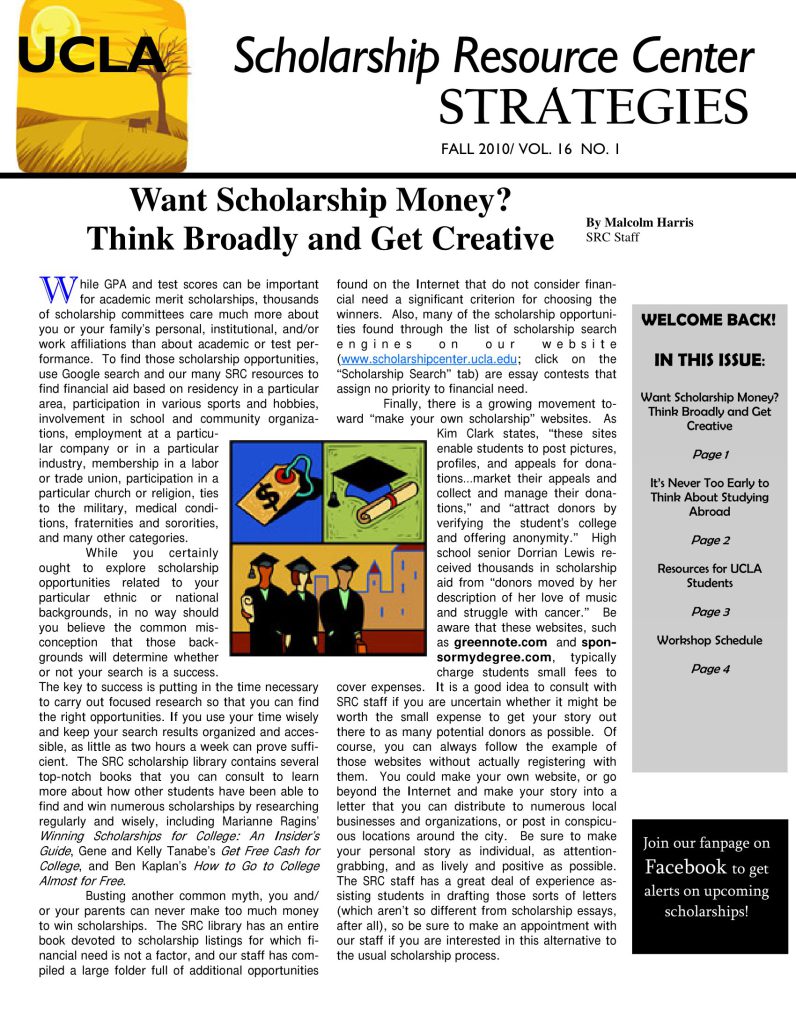
How to Build a Portfolio for Creative Arts Scholarships
Transitioning from the importance of tracking achievements, building a strong portfolio is essential for securing creative arts scholarships. A well-curated portfolio showcases your talent, dedication, and growth within your artistic discipline, making a compelling case to scholarship committees.
- Select Your Best Work:
- Choose a variety of pieces that highlight your range and skills. Include different mediums or styles to demonstrate versatility. For example, if you're a visual artist, you might showcase paintings, drawings, digital art, and photographs to provide a comprehensive view of your creative abilities.
- Organize Your Portfolio Thoughtfully:
- Arrange your work in a logical order, starting with your strongest pieces. Consider grouping similar kinds of work together or presenting them chronologically to show your artistic progression over time.
- Include Descriptions:
- Add brief descriptions or artist statements for each piece. Explain your creative process, the inspiration behind the work, and any challenges you encountered. This gives context to your pieces and allows reviewers to understand your artistic vision.
- Use High-Quality Images:
- If your portfolio includes visual art, ensure all images are high-resolution and well-lit. Poor-quality images can detract from the merit of your work. For digital portfolios, tools like Adobe Portfolio or Behance can help present your work professionally.
- Seek Feedback:
- Before finalizing your portfolio, share it with teachers, mentors, or peers for feedback. Fresh perspectives can help you refine your portfolio and suggest additions you may not have considered.
For example, a mentor might recommend including a video of a performance or a time-lapse of your artistic process, showcasing not just the final product but your dedication and effort. By creating a polished and thoughtful portfolio for creative arts scholarships, you can effectively communicate your passion and talent, increasing your chances of standing out in a competitive applicant pool.

The Role of Mentorship in Achieving Success with Applications
Transitioning from the importance of building a portfolio for creative arts scholarships, mentorship plays a vital role in navigating the scholarship application process. A strong mentor can provide guidance, support, and valuable insights that can enhance your overall application.
- Personalized Guidance:
- A mentor can offer tailored advice based on their experiences and knowledge of the scholarship landscape. Whether it's refining your essays or identifying scholarships that align with your goals, their insights can prove invaluable.
For example, a mentor who has successfully navigated similar scholarship applications can share strategies that worked for them and suggest elements to focus on in your submissions.
- Encouragement and Accountability:
- Mentors can motivate you to stay on track with your applications. Regular check-ins can help hold you accountable for deadlines and progress, ensuring you don’t procrastinate. Their encouragement during this competitive process is vital for maintaining momentum.
- Networking Opportunities:
- An experienced mentor might connect you with their professional network, opening doors to additional scholarship opportunities or internships. These connections can lead to collaborations or references that strengthen your application.
- Providing Constructive Feedback:
- A good mentor will review your application materials and offer constructive feedback. Their perspective can help you identify areas for improvement, ensuring your submission is polished and compelling.
By leveraging mentorship throughout the scholarship application process, you can gain essential support and guidance that will help you navigate challenges and ultimately enhance your chances of success in securing valuable funding for your education.
Leave a Reply